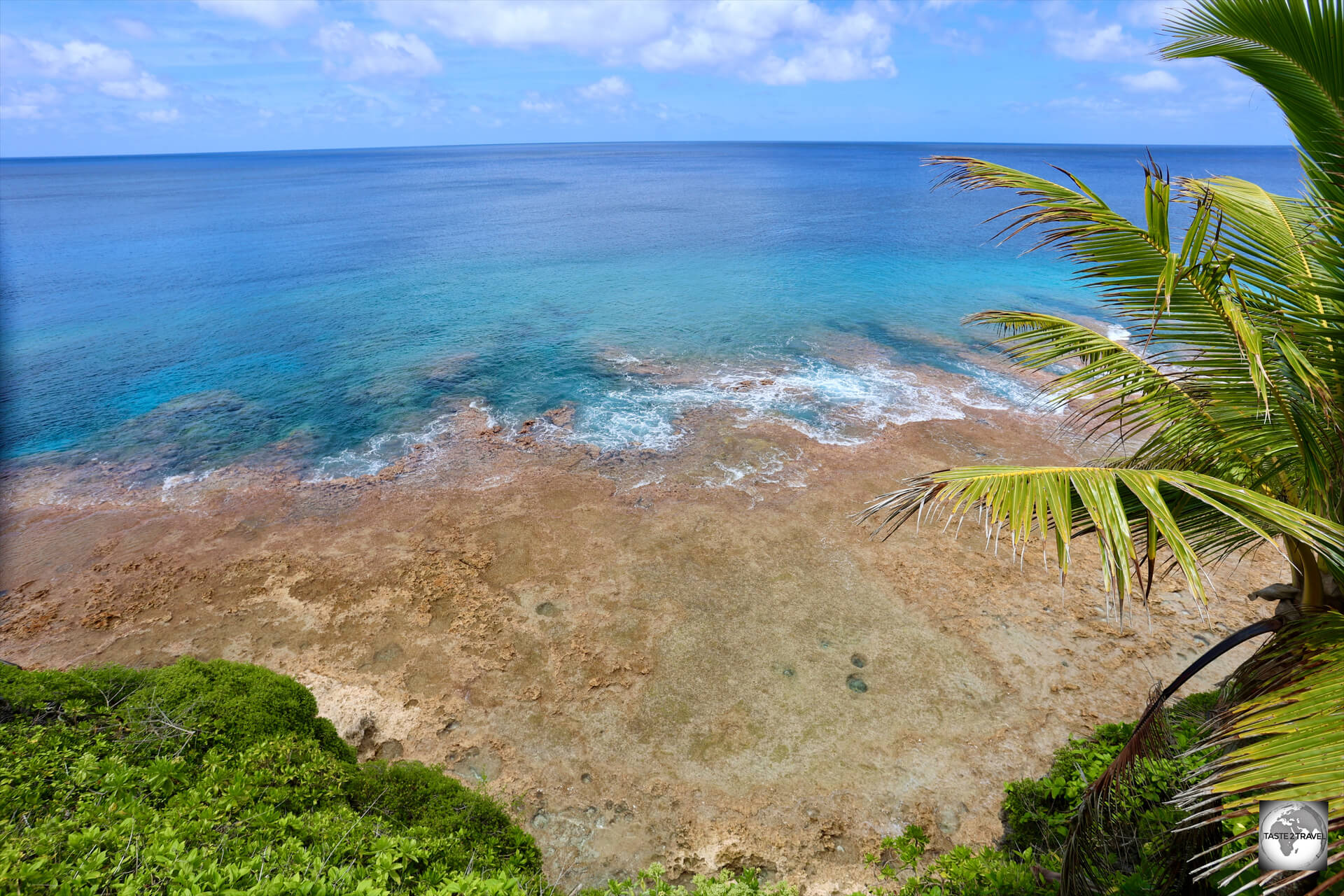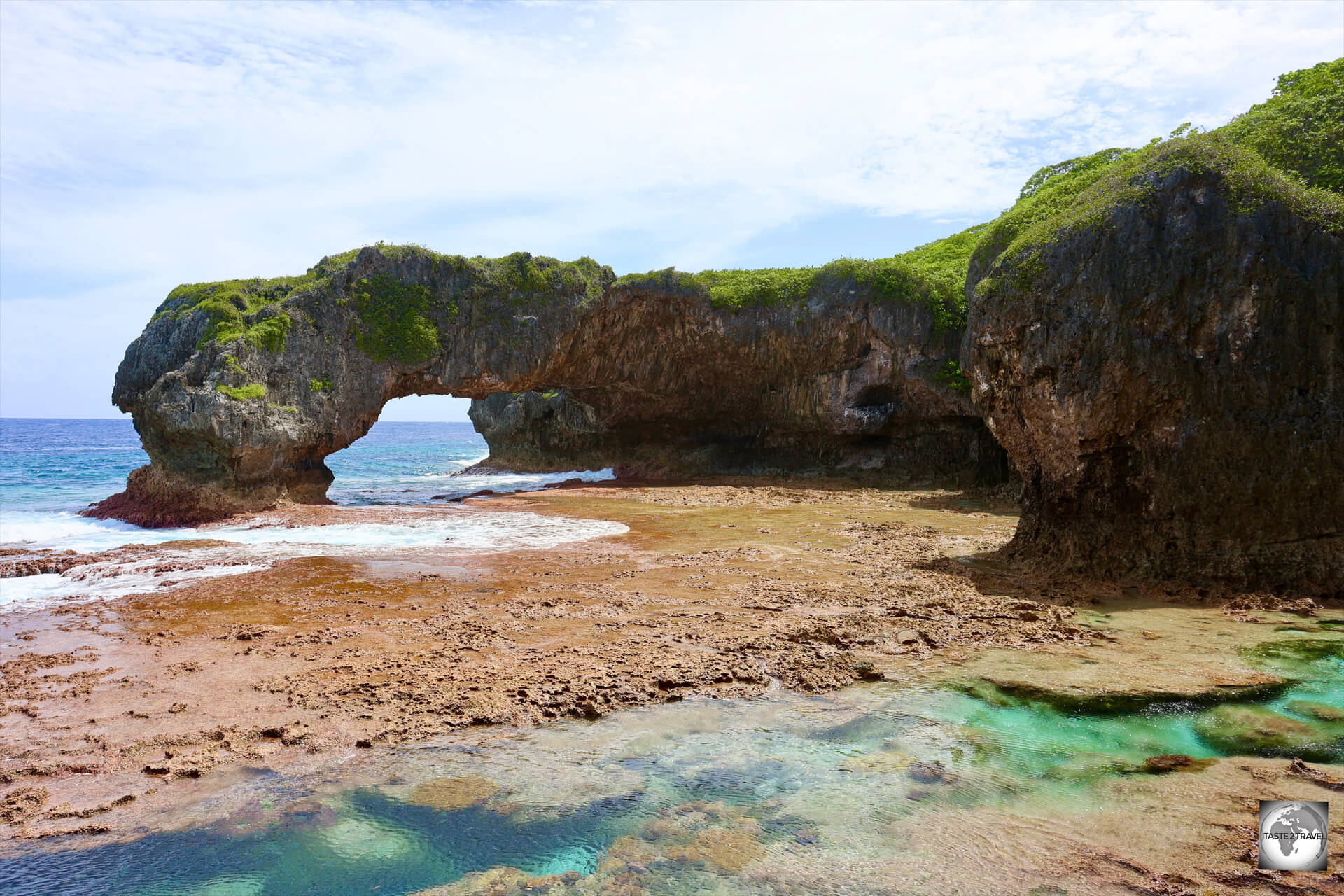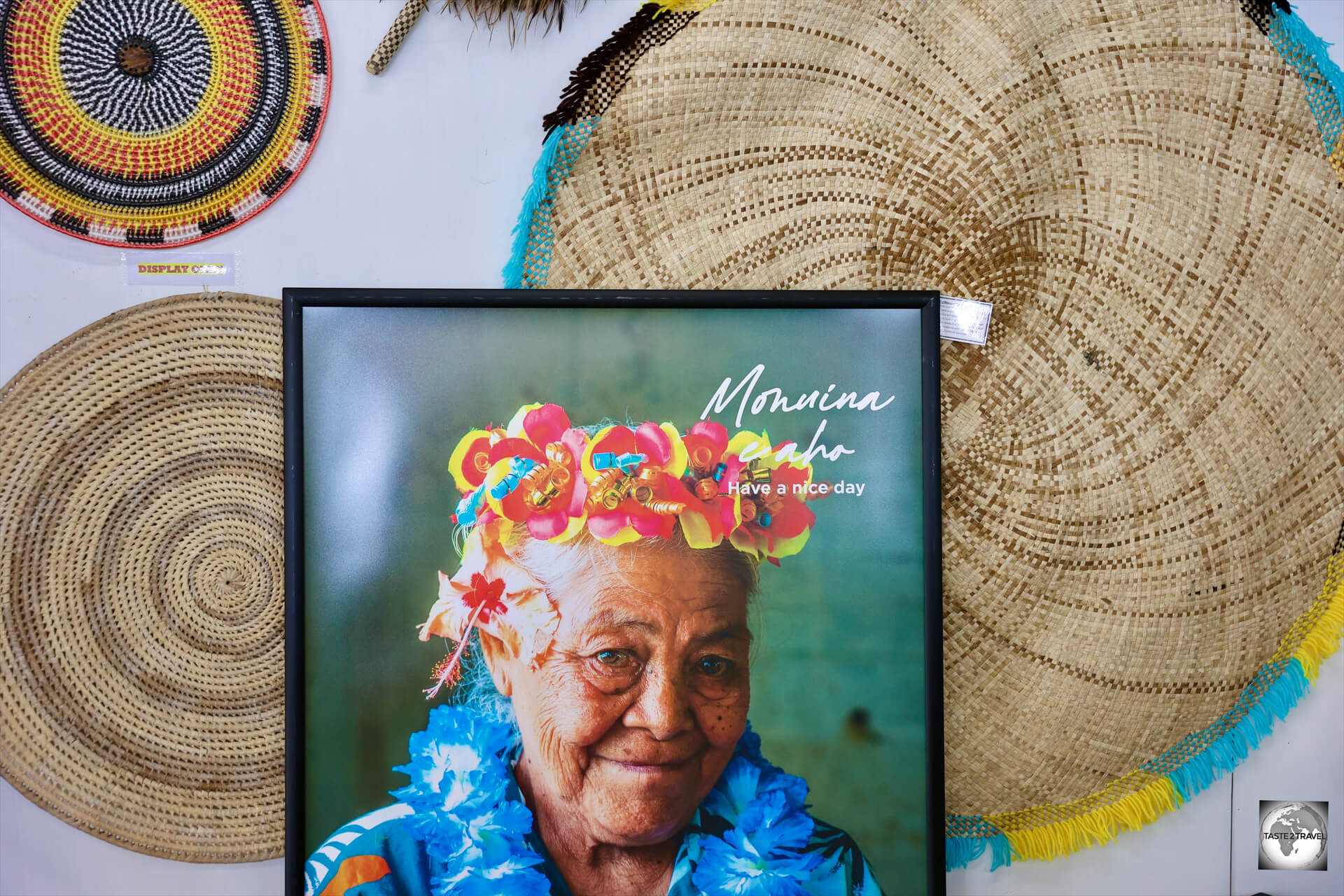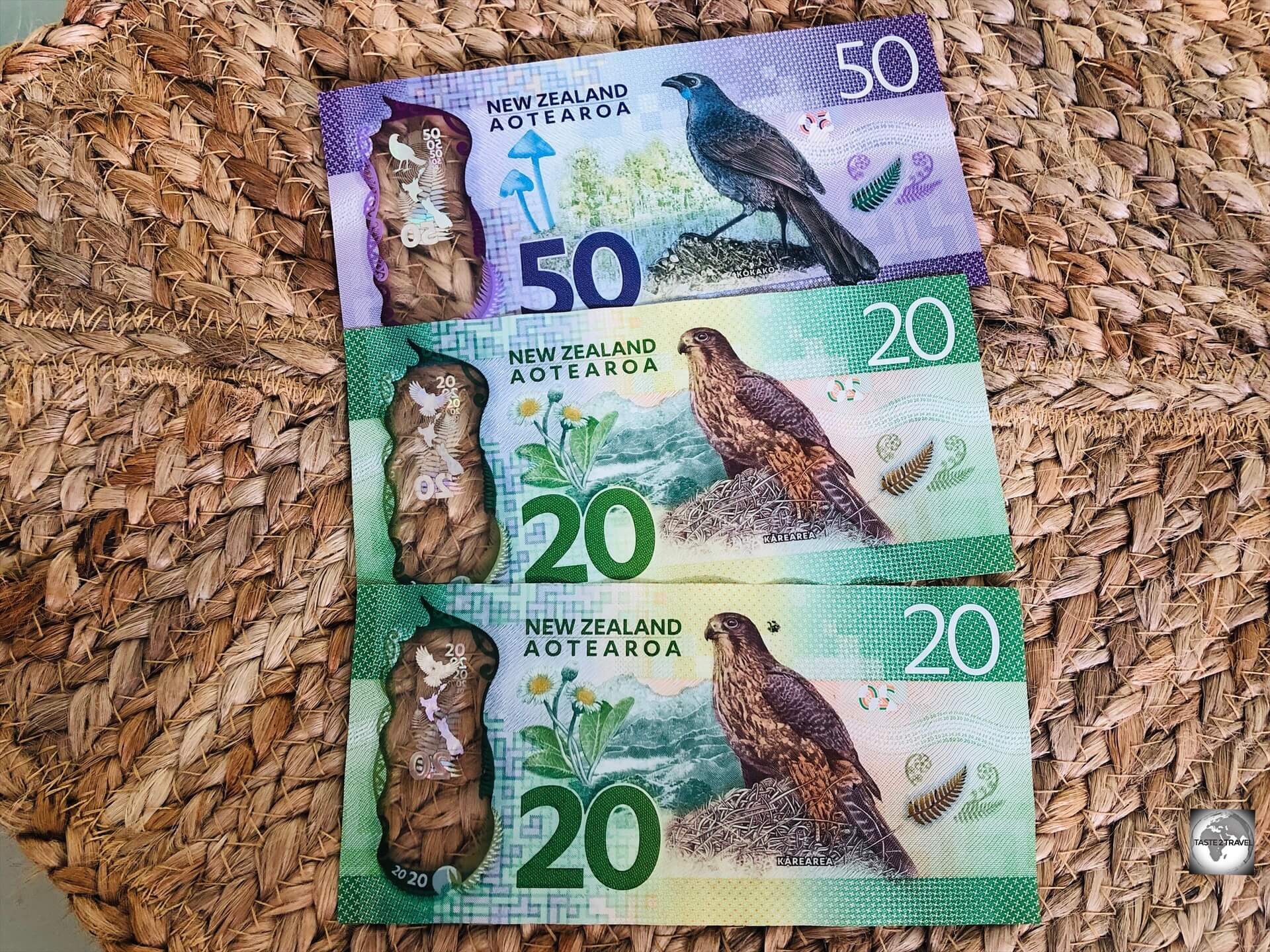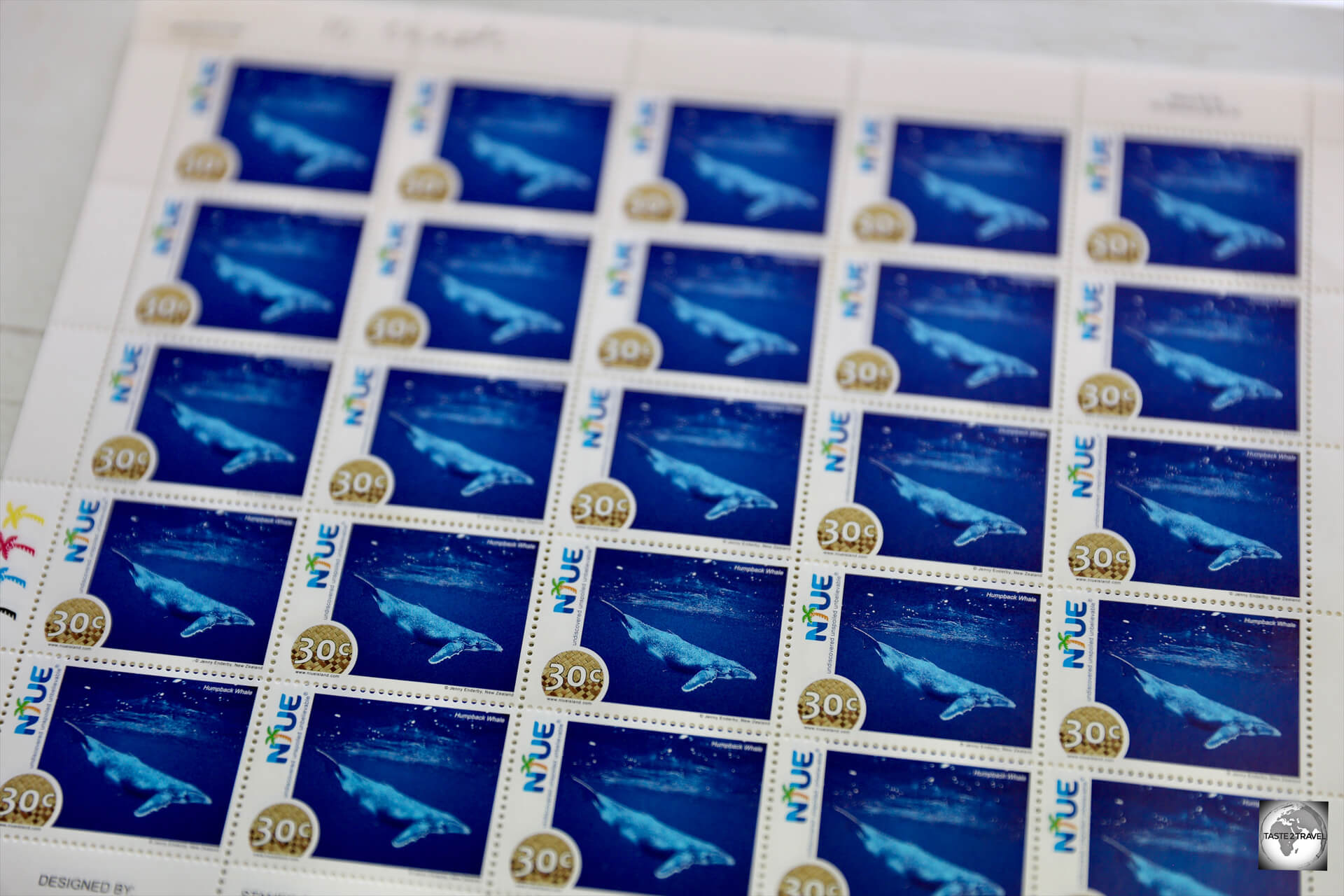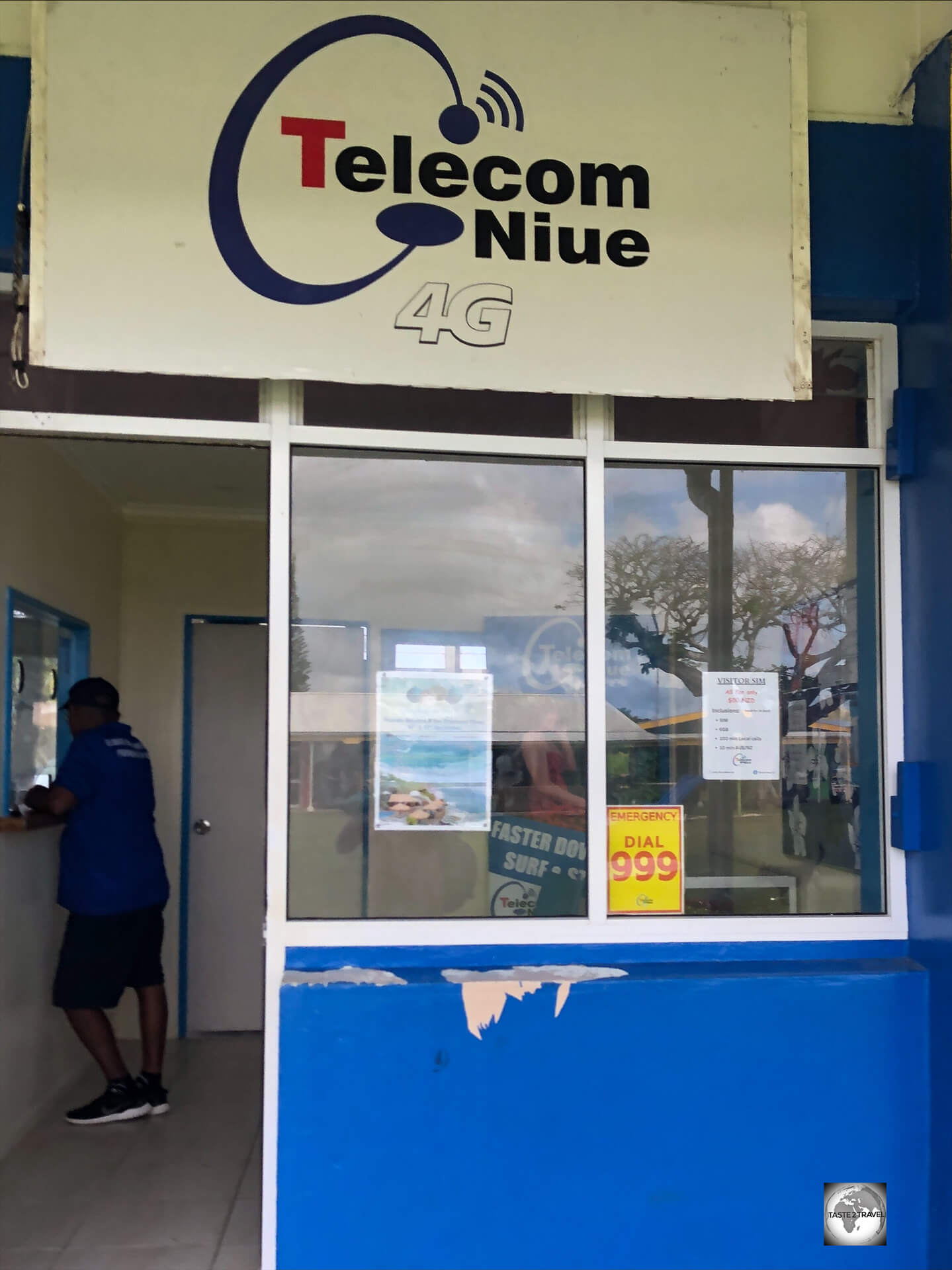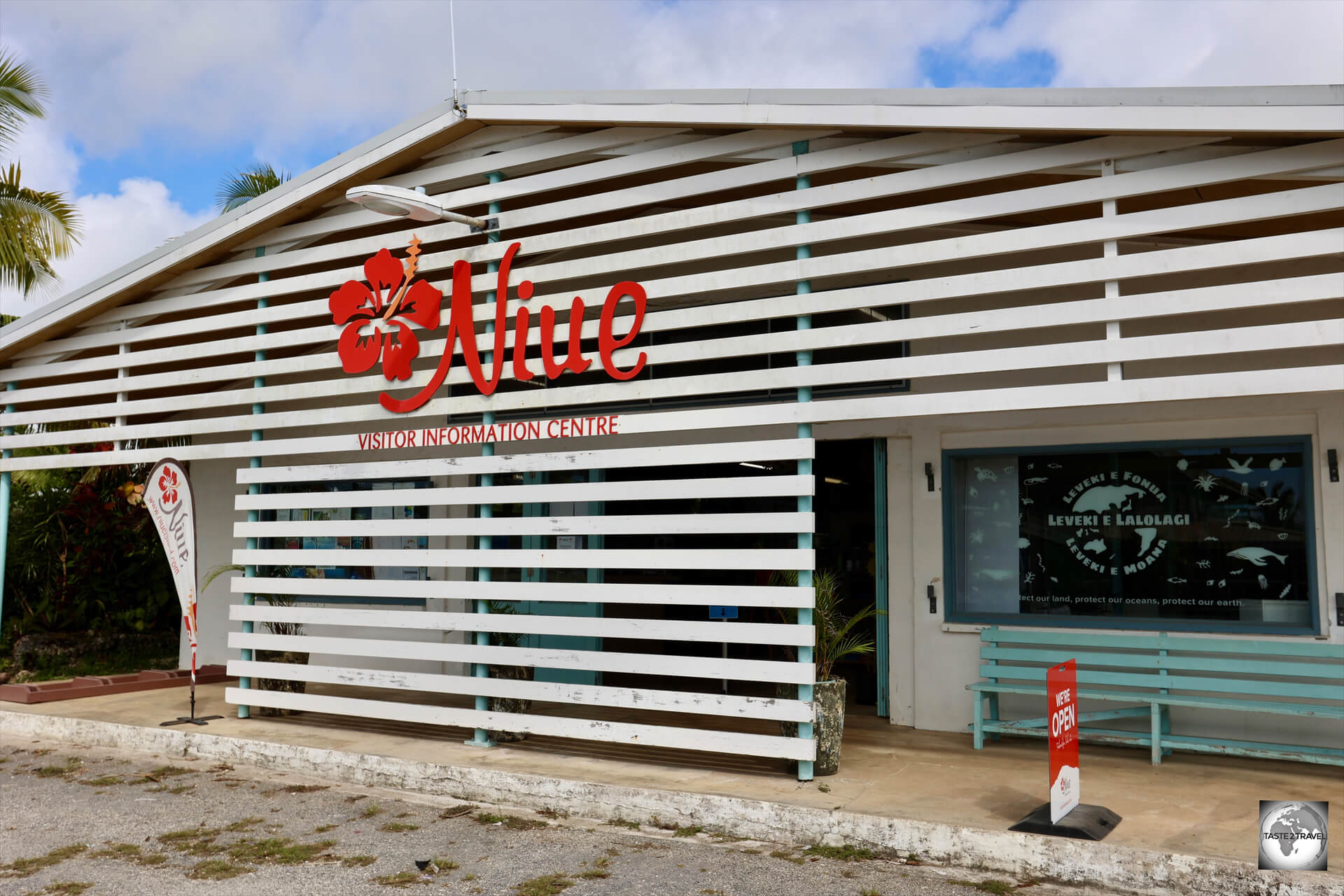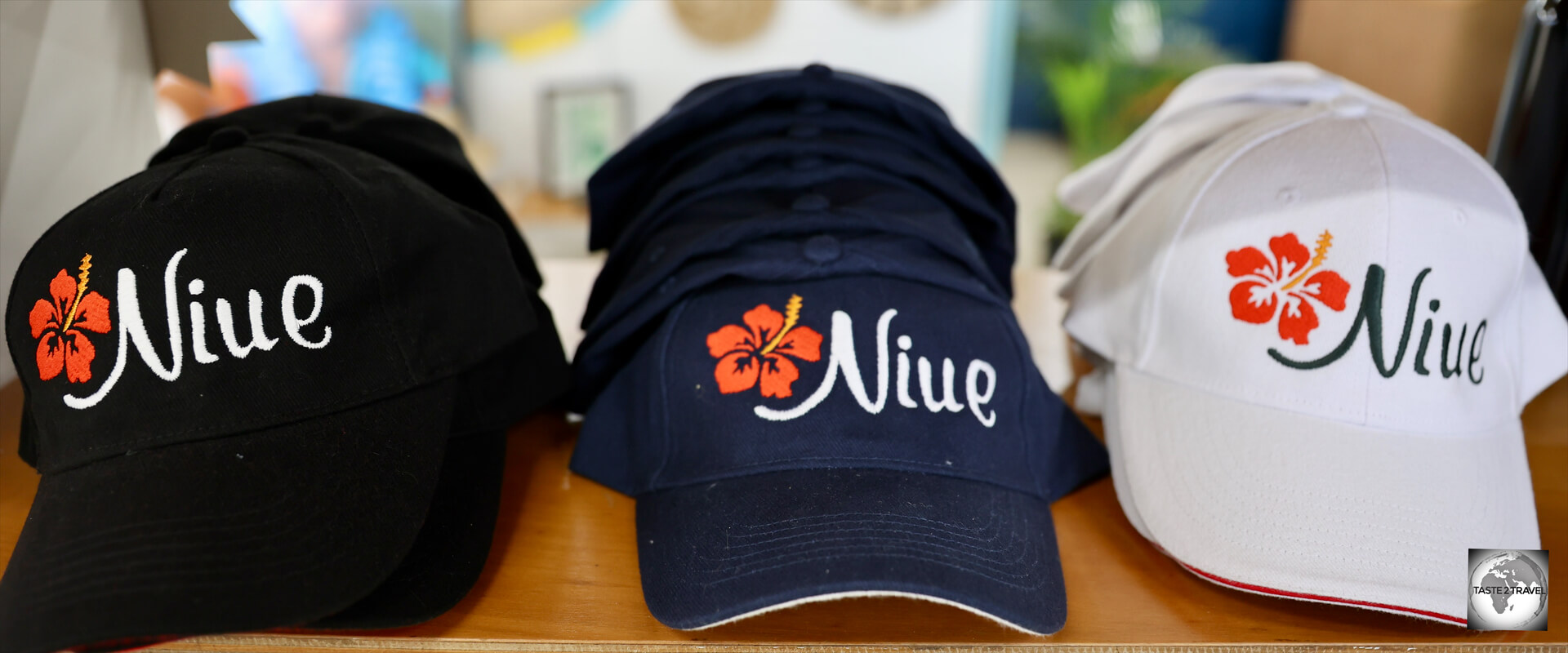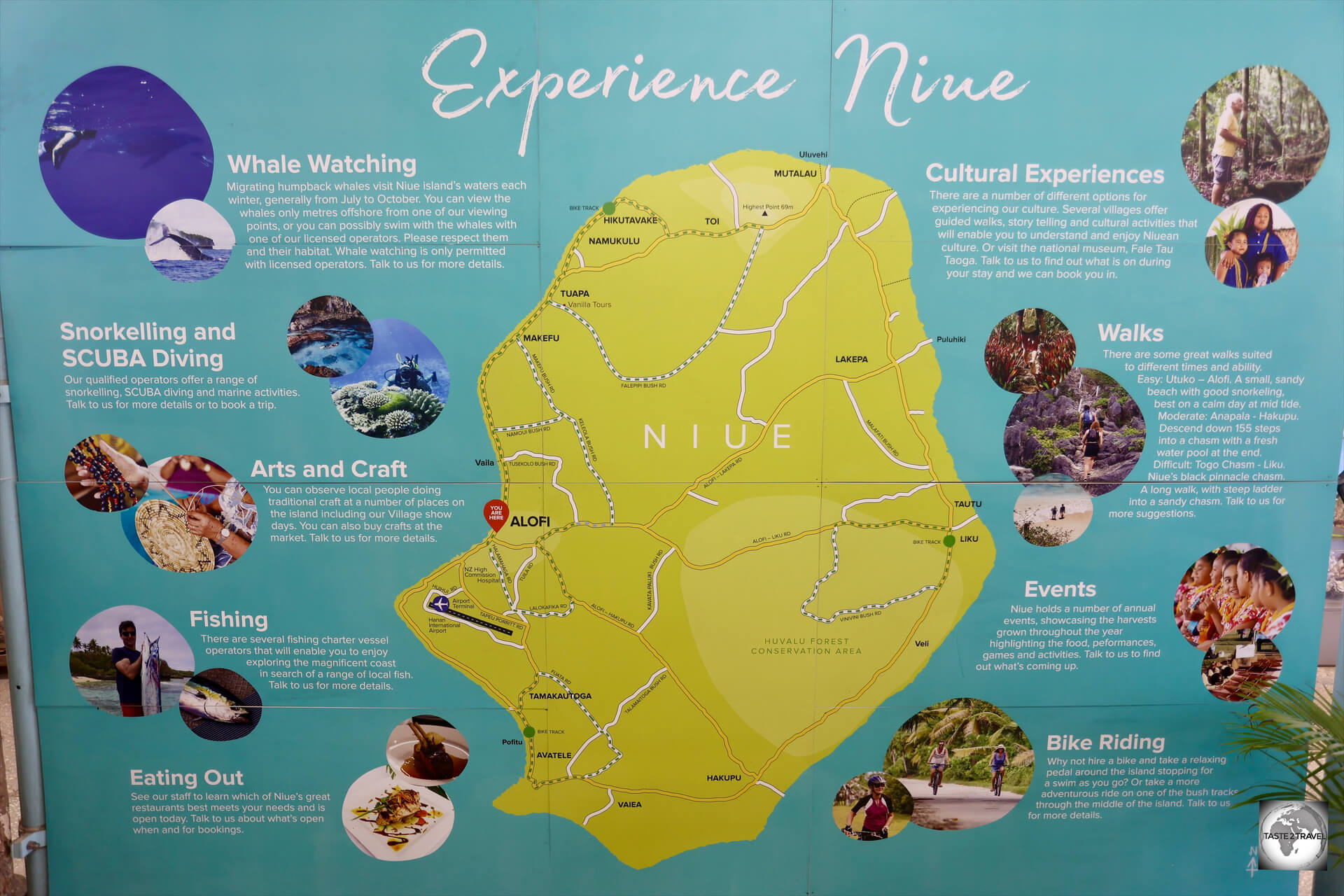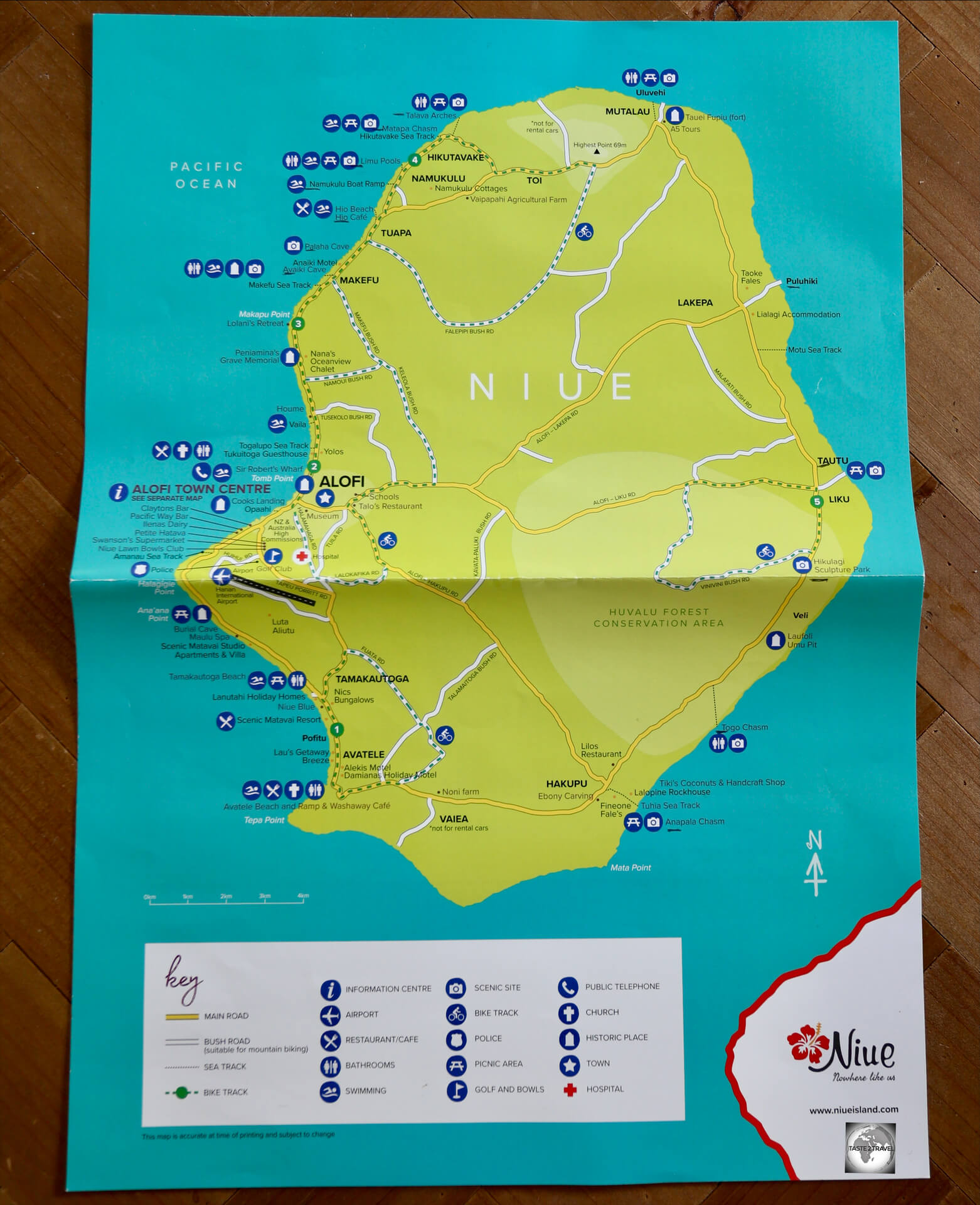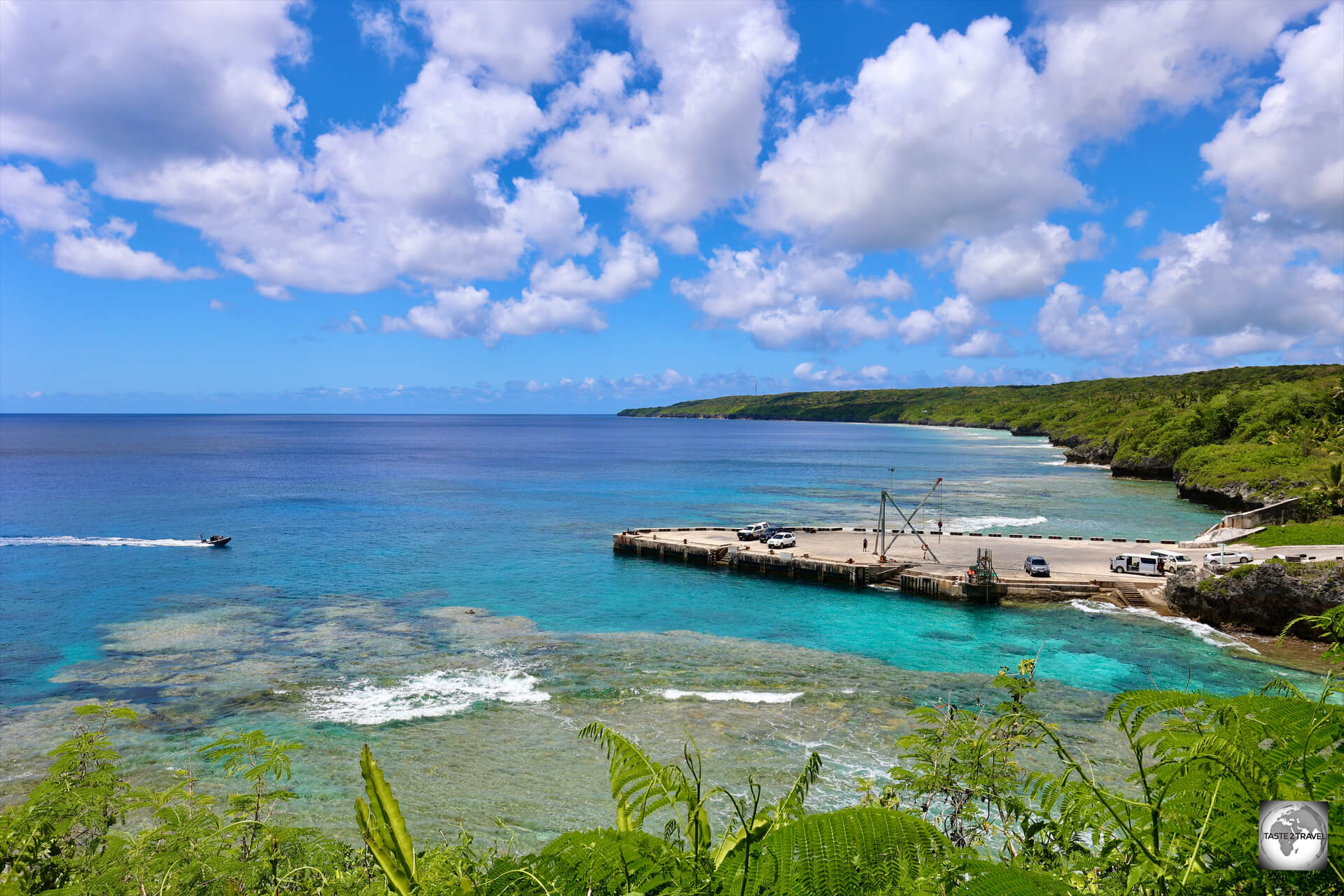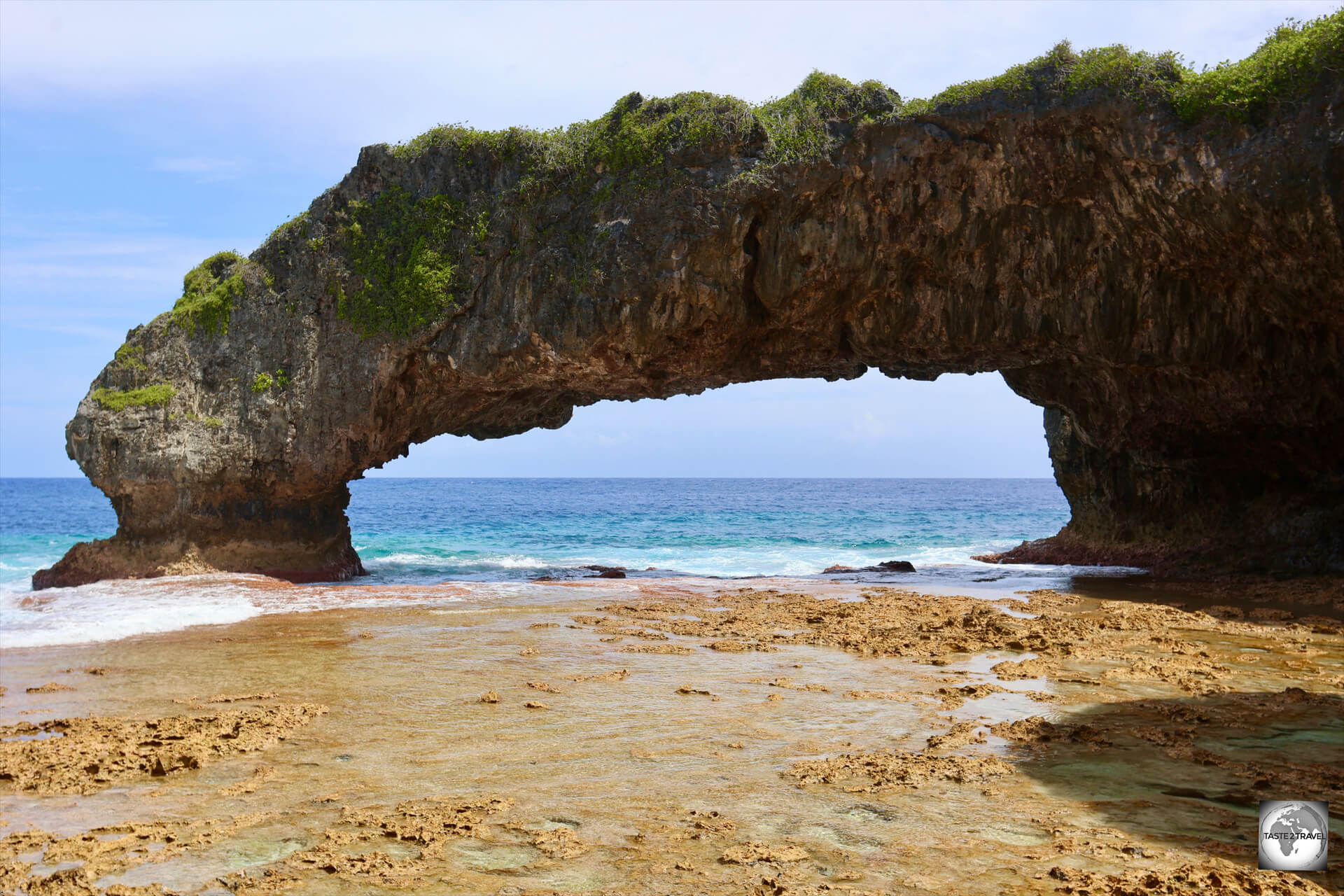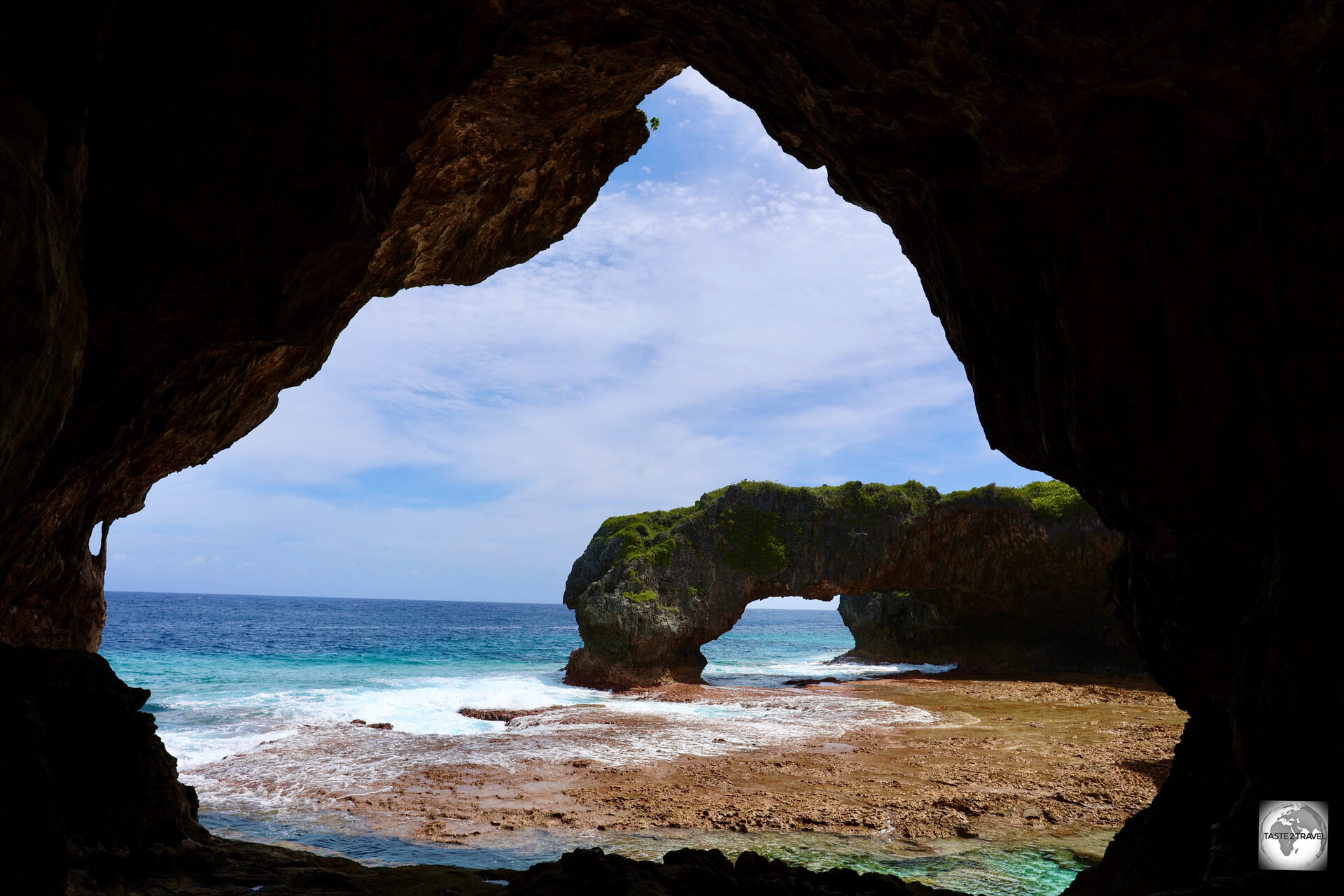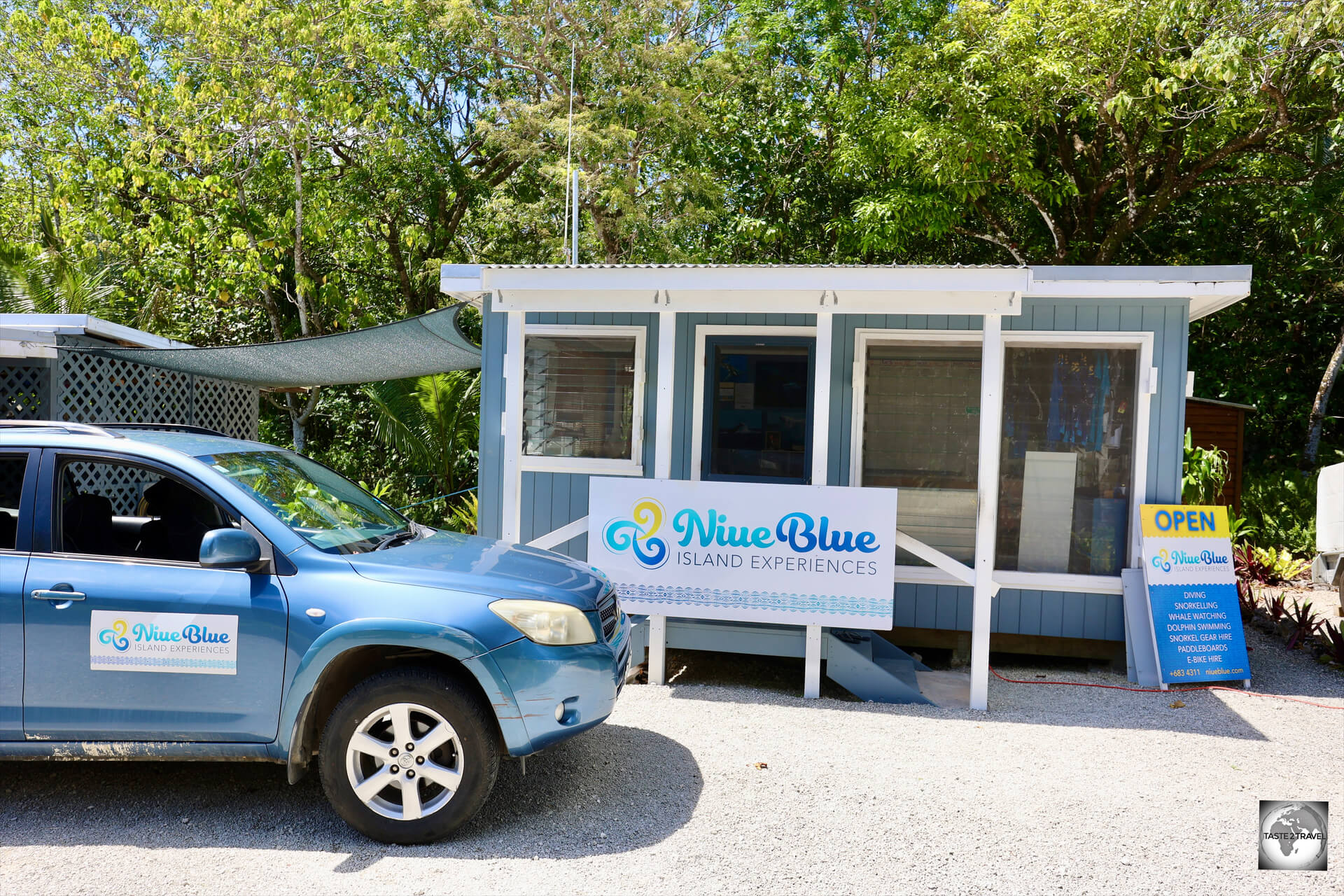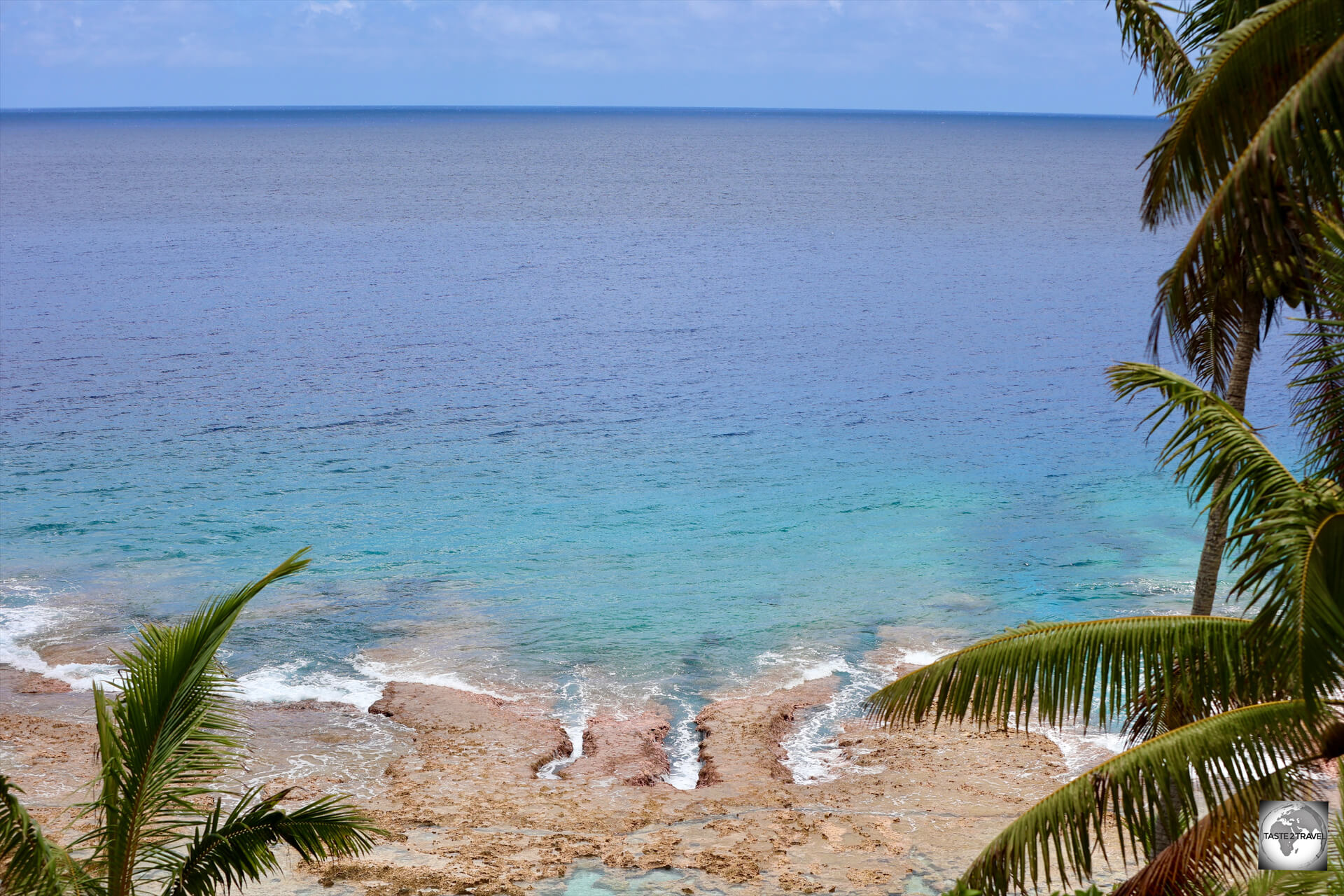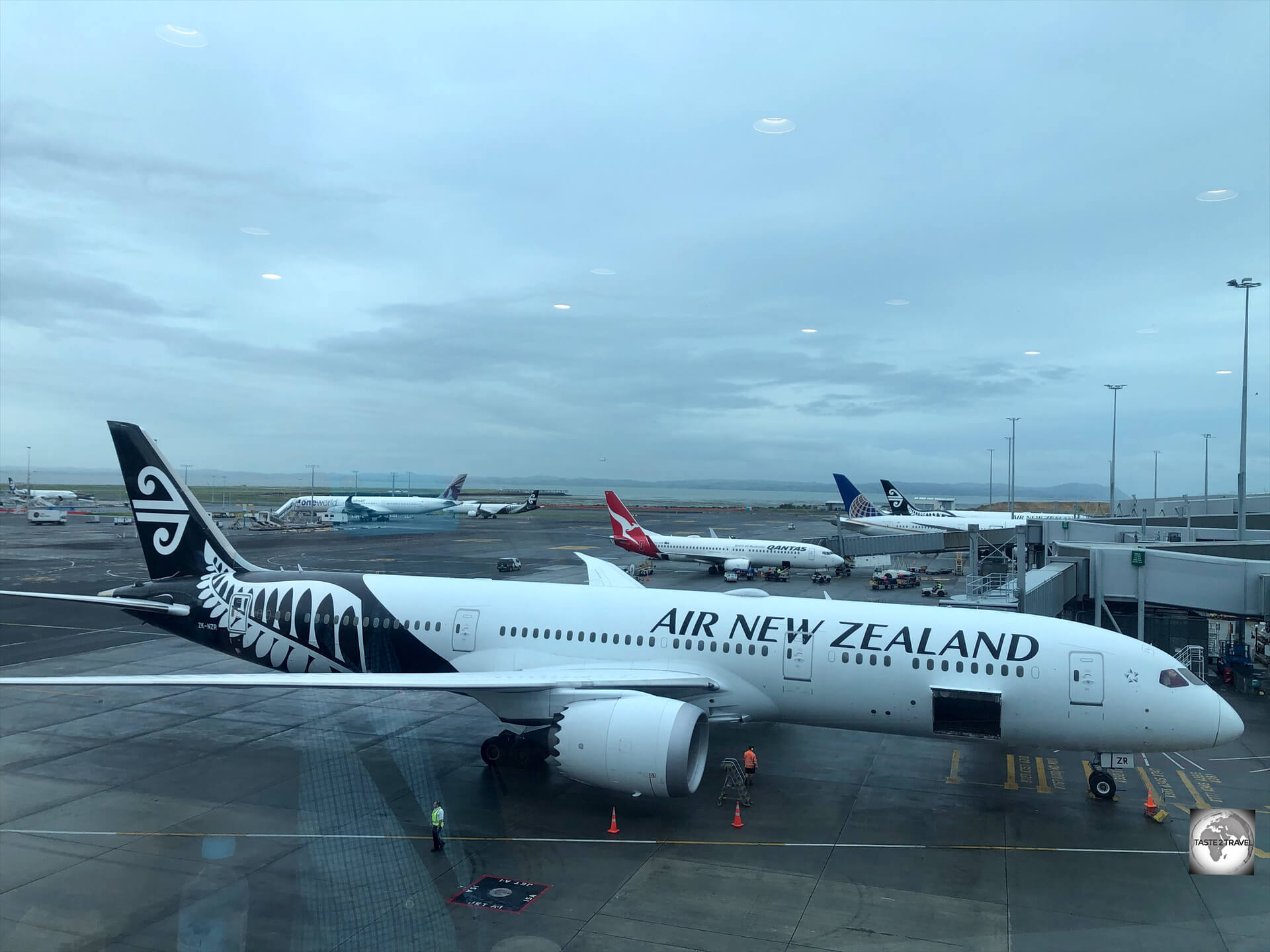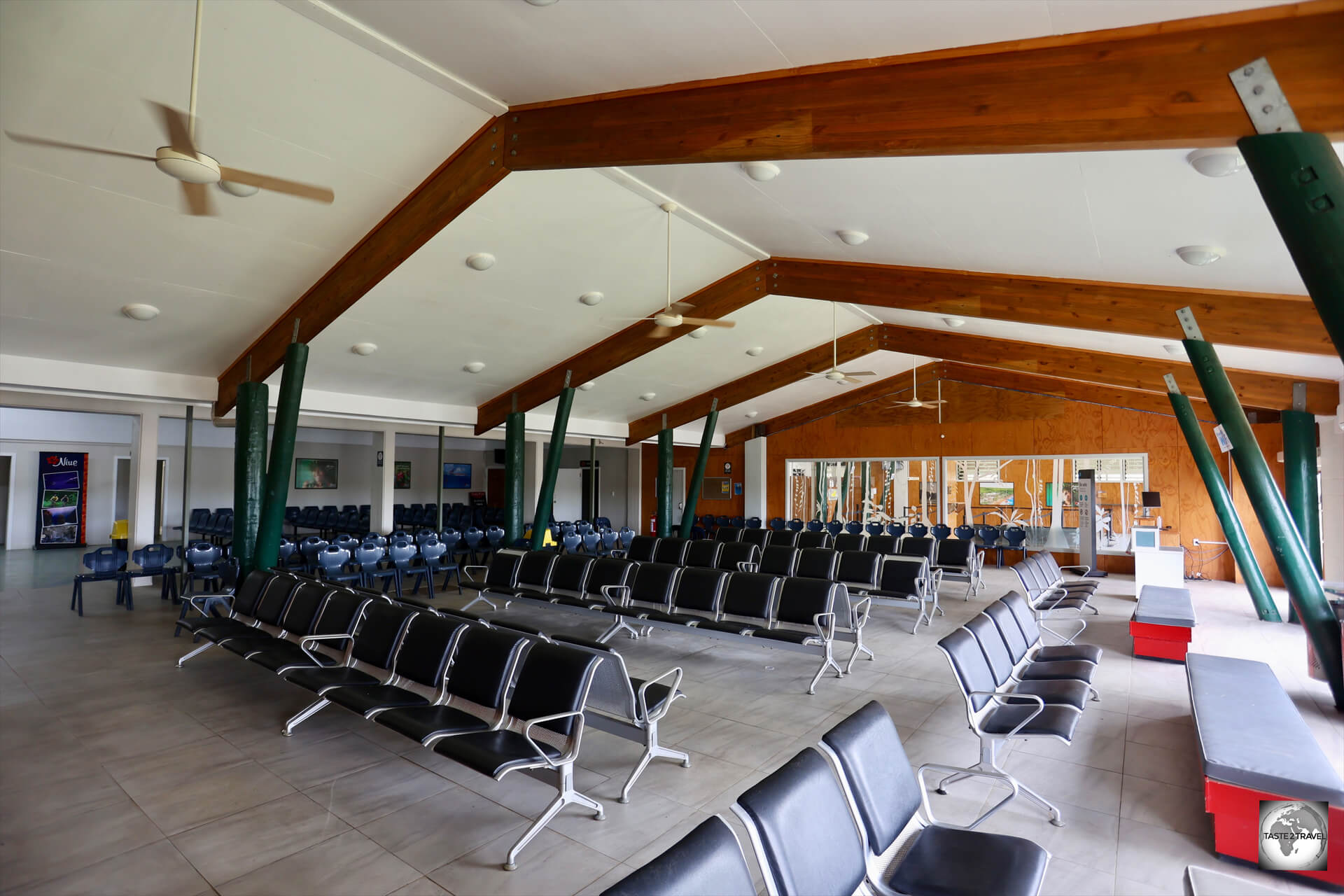Niue Travel Guide
This is a Niue Travel Guide from taste2travel.com
Date Visited: December 2023
Introduction
Affectionally known as ‘The Rock’, the tiny Pacific Ocean island of Niue is a charming, remote, off-the-beaten track destination.

A raised limestone reef with no beaches, but plenty of cliffs and reef, Niue is affectionally known as ‘The Rock’.
With a small and friendly population of 1,620 Polynesians, tiny Niue is full of surprises. The name Niue (pronounced ‘Noo-ay‘) translates as ‘behold the coconut’.
A raised slab of limestone reef, the profile of Niue is similar to that of a ‘top hat’, with sheer cliffs rising up 20 metres from the sea, forming the sides of the hat.
The top of the hat is a large flat plateau, while the ‘rim’ of the hat is a fringing reef which surrounds the entire island. There are just a few places where narrow channels through the reef allow locals to access the sea.
The entire population lives on the plateau, with everyone living along the coast, while the empty interior of the island is uninhabited and occupied by forest and taro fields.
A 62 km (38 mi) ring road around the coast links all of the island’s communities. Two cross-island roads link the west and east coast, a drive of just 19 km (12 mi).
Most of population lives on the west coast (the leeward side of the island), in and around the main town, and administrative centre of Alofi.
The east coast (the windward side of the island) is sparsely populated, being home to a few sleepy villages.
Being surrounded by a fringing reef, Niue lacks the sandy beaches which might otherwise attract the tourist hordes. However, what the island lacks in beaches, it makes up for in other ways.
The entire coast is lined with dramatic limestone caves, chasms, arches and other geological wonders.
Well maintained sea tracks provide access to turquoise-blue swimming holes where a rich array of tropical fish can be found. There are many snorkeling opportunities on the island.

Close to the shore, the water depth is around 50 metres, while a few kilometres from shore, the water depth is 2,000 metres.
Beyond the reef, the island slopes away quickly, with water depths ranging from 50 m (165 ft) near the shore, to a depth of over 2,000 m (6,560 ft) within a few kilometres of shore.
Update: August 2024 – “Protecting Paradise: The Story of Niue”
A recently released National Geographic documentary, “Protecting Paradise: The Story of Niue”, captures the spirit of the Niueans and the beauty of this special paradise island.
Scuba Diving conditions on Niue are perfect! With an absence of sand and a lack of rivers on the island, there is nothing that disturbs the incredible clarity of the sea water. Water visibility is excellent up to 85 metres.
There is one scuba diving shop on the island – the excellent and professional Niue Blue. I did a 2-tank dive with them which was a highlight of my trip. For more information, please refer to the ‘Scuba Diving‘ section below.
While not a cheap destination (please refer to the ‘Costs‘ section below for more information), Niue is a charming, surprising and engaging destination.
With a small and friendly local population, this tiny island will surprise and delight with all it offers.
In just over 3-hours flying time from Auckland, New Zealand, visitors to Niue will find themselves transported to another world. With its Jurassic-like geological formations and crystal-clear waters, Niue is like no other destination!
Highly recommended!
Location
Niue is a small island nation located in the South Pacific Ocean. It is situated about 2,400 kilometres (about 1,500 miles) northeast of New Zealand, within the triangle formed by the Cook Islands, Tonga, and Samoa.
Niue is known as a raised coral atoll, and its terrain is characterized by limestone cliffs, caves, and a central plateau.
The island has a total land area of about 260 square kilometres (100 square miles).
The coastline features a fringing reef which is backed by rugged cliffs.
The capital and largest village is Alofi, located on the western coast of the island.
While Niue is a relatively small and isolated island, it is surrounded by the vast expanse of the Pacific Ocean, making it a remote but scenically beautiful destination.
The island’s isolation and unique geography contribute to its distinct cultural and environmental characteristics.

A noticeboard on Niue illustrates cyclone intensity levels. Watch what happens to the tree at each level.
Niue is located in the Pacific cyclone zone and has been battered by severe cyclones in the past.
In 2004, Cyclone Heta, a Category 5 cyclone, caused massive damage to Niue, with huge waves breaking on top of the (20 metre high) sea cliffs.
People
The people of Niue are known as Niueans. Home to a small, close-knit community of 1,620 souls, the population is, predominately, of Polynesian descent.
Due to its small population and close-knit community, social relationships are often tightly woven, and individuals often have multiple roles within the community.
Religion, particularly Christianity, is also an important aspect of Niuean life, and the majority of the population is affiliated with various Christian denominations.
Niueans are known for their warm hospitality and strong sense of community.
The culture places a high value on respect for elders and a communal approach to decision-making. Traditional customs and practices, such as dance, music, and art, play a significant role in Niuean life.
The Niuean language, closely related to other Polynesian languages, is an essential part of their cultural identity.
In recent years, Niue has faced challenges related to depopulation, with some Niueans migrating to New Zealand and other countries for better economic opportunities.
However, efforts are being made to preserve and promote Niuean culture and identity both on the island and within the diaspora.
Niuean Hiapo
Traditional bark cloth painting is something which is found throughout the islands of the south Pacific.
On Niue this lost art form, which is known locally as Hiapo, is being revived by Niuean artist Cora-Allan Wickliffe.
Examples of Hiapo art adorn the walls of the Niue Visitors Centre and the Scenic Matavai Resort Niue.
Flag
The flag of Niue was adopted on 15 October 1975. It consists of the Union Jack in the upper left corner with a star in the middle of the Union Jack and four stars forming a diamond around it.
It is very unusual for a flag based on a British ensign design, in having not only a yellow background, but also a defaced (edited) Union Jack in the canton.
The flag was designed by Patricia Rex, the wife of the then-Premier Robert Rex.
The design elements of the flag include the Union Jack, which symbolises the protection granted by the United Kingdom in 1900 after petitioning by the Kings and Chiefs of Niue.
The yellow field symbolises “the bright sunshine of Niue and the warm feelings of the Niuean people towards New Zealand and her people.”
The association with New Zealand, which took over responsibility and administration of Niue in 1901, is also represented by the four small stars that depict the Southern Cross.
Finally, the blue disc containing a larger star represents the deep blue sea surrounding the self-governing island of Niue
Currency
The official currency of Niue is the New Zealand Dollar (NZD). Niue does not have its own separate currency and has chosen to use the New Zealand Dollar as its official legal tender.
This arrangement is part of Niue’s status as a self-governing territory in free association with New Zealand.
As a result, the New Zealand Dollar is widely used for everyday transactions, and the Reserve Bank of New Zealand is responsible for issuing and regulating the currency in Niue. The coins and banknotes used in Niue are the same as those used in New Zealand.
Exchange Rates
As of December 2023, the exchange rate between the NZD and USD was:
$1 NZD = $0.60 USD
To check the current exchange rate, please click here.
Banking Services
There is just one bank on Niue – the Niue Development Bank.
The bank also serves as the one branch of the Niue Post Office.
ATMs

While there are no ATMs on Niue, cash can be accessed at the one branch of the Niue Development Bank in Alofi.
There are no ATMs on Niue, but you can withdraw cash at the one branch of the Niue Development Bank which is located in Alofi.
Credit Cards
Credit cards, such as MasterCard and Visa are widely accepted on Niue.
Most merchants on the island have EFTPOS terminals and prefer cashless payments.
Rarely did I need to use cash, however, it’s prudent to carry some cash from New Zealand for emergencies.
While your home bank will most likely charge you an ‘exchange’ fee for any overseas credit card transactions, businesses on Niue will additionally charge you a credit card usage fee, which is typically around 3-5% on each transaction.
Philately
Niue is known for issuing a variety of colourful and thematic postage stamps.
Stamps are often issued to commemorate special occasions, anniversaries, and international events, making them not only a means of postage but also a form of cultural expression and representation for the people of Niue.
These stamps often feature unique designs that showcase the natural beauty, culture, history, and important events related to Niue.
The themes of Niuean stamps can vary widely, including marine life, endemic flora and fauna, cultural symbols, historical figures, and significant events.
Niue is part of the wider philatelic community and often collaborates with other countries on joint stamp issues. These joint issues may commemorate shared historical or cultural connections.
Niue Philatelic and Numismatic Corporation

The office of the Niue Philatelic and Numismatic Corporation (NPNC) is in a small shopping complex behind Swanson’s supermarket.
While on the island, stamps can be purchased from either the one branch of Niue Post which is housed inside the Niue Development Bank branch in Alofi or from the Niue Philatelic and Numismatic Corporation (NPNC), which is in a small shopping complex, behind Swanson’s supermarket.
Also available from the NPNC are specially issued Niue commemorative coins, which are produced by the New Zealand Mint.
The staff at the NPNC can be contacted for any overseas orders.
Contact details are:
- Phone: +683 4643
- Email: Mesepa.talaniseu@mail.gov.nu
Internet Services
One of the first stops for many visitors to Niue is the office of Telecom Niue, the sole provider of telecom services on the island.
Telecom Niue does not have any international roaming agreements with foreign operators; therefore, you cannot use roaming while in Niue.
If you wish to have internet connection while on Niue, you will need to buy a Visitor SIM card, which can be purchased from the Telecom Niue office which is located in the Alofi Commercial Centre.
All services are provided on a fast 4G network. However, if there is a power outage in Alofi (as happened several times during my stay), internet is lost across the entire island.
A Visitor SIM costs NZ$50, is valid for 14 days and includes 6GB of data, plus unlimited local calls, and 10 minutes of calls to Australia or New Zealand.
Costs
Most people visit Niue for 7 nights, which coincides with the flight schedule. With a 2nd weekly flight now operating, it is possible to visit for 3 nights.
The cost of a holiday on Niue isn’t cheap, with the biggest expenses being flights, accommodation, car rental and food. Everything really!
Sample Costs:
- Coca Cola (1.5 litre bottle) at Swanson’s: NZ$7.50 (US$4.70)
- Water (0.33 litre bottle): NZ$1.80 (US$1.13)
- Can of beer at Crow’s Nest: NZ$5.00 (US$3.13)
- Cafe Latte at the Crazy Uga Cafe: NZ$5 (US$3.13)
- Scrambled eggs breakfast at Fana Cafe: NZ$15 (US$9.40)
- Car rental (daily rate) from Niue 4×4 Rentals: NZ$60 (US$37.55)
- Litre of fuel: NZ$3.50 (US$2.20)
- Fish and chip meal at Crow’s Nest: NZ$11 (US$6.90)
- Meal at the Scenic Matavai Resort Niue: NZ$30+ (US$18.80+)
- Room at the Scenic Matavai Resort Niue: NZ$250+ (US$156+)
- Airbnb cottage (David’s Fale): NZ$160 (US$100)
- Return flights to Niue from Auckland with Air New Zealand: NZ$800 return (USD$500)
Shopping
Tahiono Art Gallery
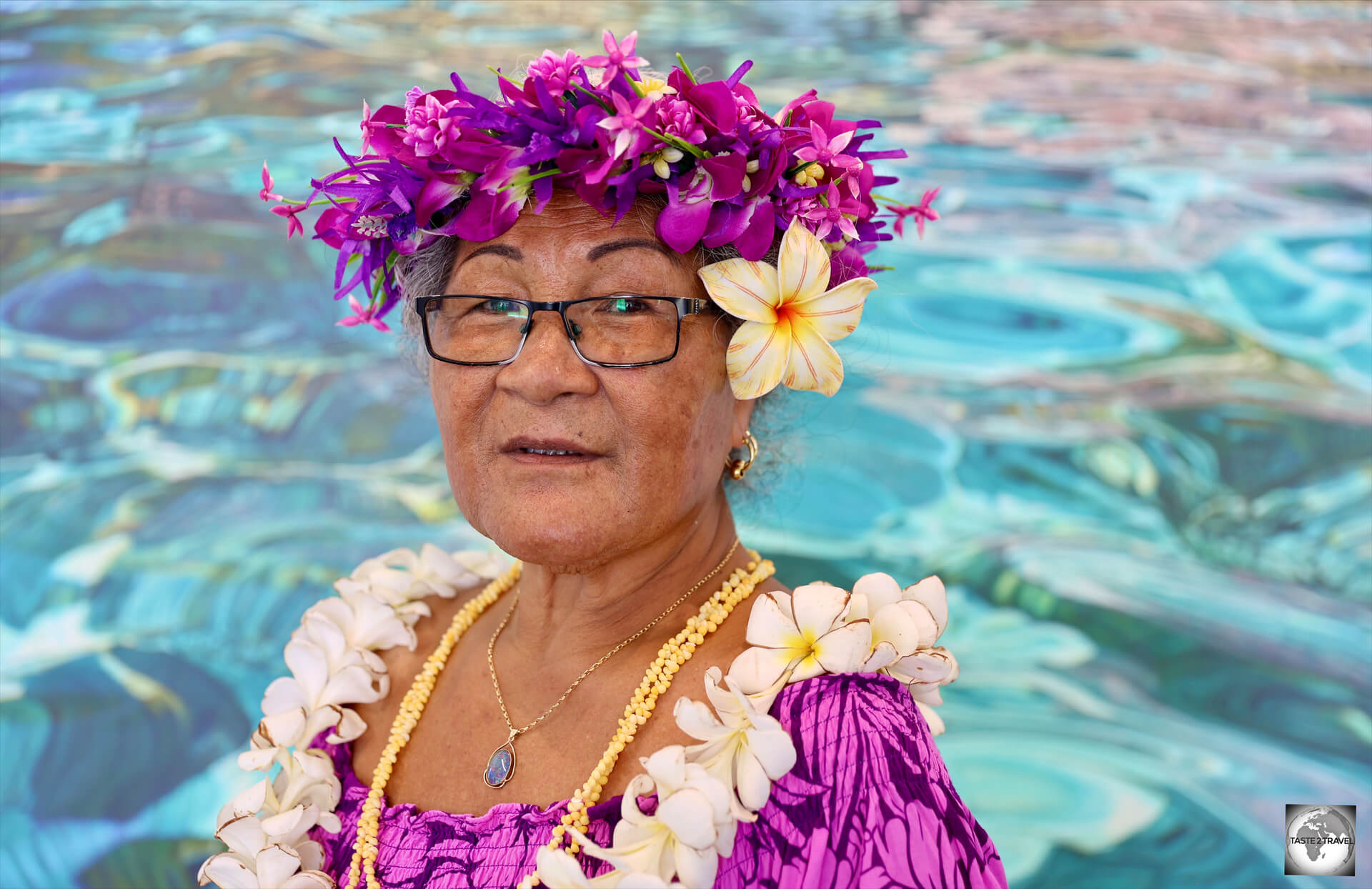
Ahi Cross, who, along with her husband, artist – Mark Cross – operate the Tahiono Art Gallery in Alofi.
As can be expected on a tiny, remote island, shopping opportunities are limited. There are a couple of shops in Alofi which sell locally produced artworks and handicrafts.
Despite its small population, the people of Niue are especially creative and talented. There are several artists living on the island, who produce magnificent works of art which make for ideal souvenirs.
One of the most prominent artists on the island is Mark Cross, a New Zealander who is married to a Niuean – the wonderful Ahi Cross (pictured above).
Mark and Ahi run the Tahiono Art Gallery which is located in the Alofi Commercial Centre.
The walls of the gallery display Mark’s paintings which depict Niuean scenes which are interpreted in his unique style.
Kauhi Krafts

The Kauhi Kraft shop is owned by Niuean artist Olga Wilson who is known for her floral artwork which is applied to a variety of materials, including textiles.
Also located in the Alofi Commercial Centre is Kauhi Kraft.
This gallery/ ice cream shop is owned and operated by Niuean artist, Olga Wilson, and her husband, Alan Wilson, who is originally from Perth, Western Australia.
Olga is known for her floral artwork which she applies to a variety of materials, including textiles. If you are staying at the Scenic Matavai Resort Niue, you will dine on table runners which have been designed by Olga.
The specialty at Kauhi Kraft are hand-painted tea towels, table runners, cushion covers, sarongs and more.
The shop also serves ice cream, which is also served in the form of delicious milkshakes.
Swanson Supermarket
The only supermarket on Niue is Swanson Supermarket, which is housed in the Swanson Commerical Centre.

Due to shipping costs, groceries on Niue are very expensive with a 1.5L bottle of Coca Cola at Swanson Supermarket costing NZ$7.50.
Offering a limited range of groceries, everything at Swanson’s is expensive due to high shipping costs. Everything arrives by container on the monthly supply ship from Auckland.
By the time all shipping costs are included, everyday items end up being priced as luxury items.
As an example, a 2L bottle of Minute Maid apple or orange juice costs NZ$13, while a 1.5L bottle of any soft drink costs NZ$7.50.

A large box of cereal for NZ$18.20! Due to shipping costs, all groceries at Swanson Supermarket are very expensive.
If you are going to be self-catering while on Niue, it’s much cheaper to carry any packaged food items from Auckland, within your luggage allowance.
It’s hard to miss the Swanson Commerical Complex, thanks to the giant Uga Crab which has been installed on the street corner, in front of the complex.
Niue Bond Store
Next door to Swanson Supermarket is the Niue Bond Store which is the one liquor shop on the island.
Naturally, this is one of the most popular shops on the island, and sells a variety of NZ wine and beer, along with international brand spirits.
The shop also serves as Niue’s only duty-free alcohol store, with flight passengers able to shop prior to their flight back to Auckland.
K-Mark
Also located in the Swanson Commerical Complex, K-Mark is the closest thing you’ll found on Niue to a real K-Mart store.
This veritable Aladdin’s Cave stocks all sorts of merchandise from toys, games, clothing, homewares and so much more.
Niue Visitor Information Centre
The Niue Visitors Information Centre in Alofi is operated by the friendly staff from Niue Tourism.
Two essential items which are available from the visitors’ centre are a map of the island plus the weekly guide which outlines the opening hours of all restaurants and cafes on the island.
Apart from dispensing information, the visitors centre is a great place to find Niue souvenirs.
The visitors centre also includes informative cultural displays and a small display of artworks by local artists.
Contact details for the Niue Tourism:
- Email: info@niueisland.com
- Instagram: https://www.instagram.com/niueisland/
- Facebook: https://www.facebook.com/NiueTourism/
- Postal: PO Box 42, Alofi 9974, Niue Island
- Phone: (+683) 4224
Sightseeing
The sightseeing section lists the sights of Niue, travelling around the island, in a clock-wise direction from Alofi.
Alofi
Tomb Point
Located across the road from the Alofi Commercial Centre, Tomb Point is a pleasant place to relax and take in the stunning views of the port and the west coast of Niue.
Given its close proximity to the takeaway food shops across the road, Tomb Point is an ideal place to relax with a picnic lunch while you take in the panoramic views of the rugged coastline.
A memorial stone at Tomb Point pays tribute to 150 Niuean soldiers, who departed from the port on the 13th of October 1915, to serve alongside New Zealand soldiers during WWI.

The gravestone of King Tui Toga (died 13th of June 1887), the 6th King of Niue who was also the island’s first Christian King.
Tomb Point serves as a graveyard for prominent Niueans, including two former Kings.
The first gravestone, as you enter the cemetery, belongs to King Tui Toga (died 13th of June 1887), the 6th King of Niue who was also the island’s first Christian King.
Another prominent gravestone at Tomb Point is that of King Fata-a-iki (died 1896), the second Christian Niuean monarch.
One of his first acts as patu-iki in 1877 was to send a letter to the British monarch Queen Victoria, requesting that Niue be made a protectorate of the British Empire, to protect the island from other imperial powers, although his letter (and another sent in 1895) received no replies.
Niue was finally ceded to the British Empire on 21 April 1900 by the 8th King of Niue, King Togia-Pulu-toaki.
From 1900 to 1901, Niue was ruled by the United Kingdom.
In 1901, the island was annexed by New Zealand, which administered it in the name of the British Empire.
On 26 September 1907, New Zealand attained the status of dominion, becoming the Dominion of New Zealand, and the British monarch from then on reigned over Niue in his or her capacity as monarch of New Zealand.
The current monarch of Niue is King Charles III.
Taoga Niue Museum
Taoga Niue Museum is a national museum and cultural centre located in the new government complex in Alofi heights.
The only museum on Niue, it is located next door to the new parliament building – the Fale Fono II, and includes a small number of engaging displays which tells the story of Niue.
If you wish to gain a better understanding of the history and culture of Niue, the Taoga Niue Museum is a compulsory stop.
Access
- Entry Fee: $10.00 (Kids & Students FREE)
- Opening Hours: Monday – Friday (9:00 AM – 3:00 PM)
- Closed: Saturdays, Sunday & Public Holidays
Coastal Niue
Palaha Cave
A short, clearly signposted, sea track in Tuapa village leads down to this shoreline cave.
Palaha Cave is a large, multi-level, cavern which opens out onto the pounding sea. The cave is full of stalactites and stalagmites in various vivid colours, thanks to the presence of different minerals.
Namukulu Boat Ramp
Located in the northwest corner of Niue, the Namukulu boat ramp is one of just two such ramps on the island.
Thanks to a small channel in the reef, local fisherman are able to launch their boats from this spot!
Limu Pools
A short drive further north along the coast, a clearly marked sea track leads down to the magical and enchanting world of the Limu Pools.
This is a popular place for snorkeling, which can be done in small, protected, turquoise-coloured pools.
Most of the coastal sights on Niue are accessed via short (200-metre-long) sea tracks. These ‘tracks’ are well-maintained walking paths with hand-rails and grip pads to prevent slipping.
Matapa Chasm
Further north along the coast, the next sight of interest is the spectacular Matapa Chasm.
The chasm is accessed via a flat, 200-metre-long sea track which leads from the road, through an ancient chasm to the coast.
Matapa Chasm is a mix of cooler, fresh water – which sits on top of warmer sea water. While swimming, you can feel the cooler fresh water cooling the top of your body, while the warmer sea water warms your legs.
The chasm is a great place for swimming and snorkeling, although on incoming and outgoing tides, the movement of water from the sea can cause strong currents inside the chasm.
Talava Arches
Also, from the same car park as Matapa Chasm, a longer, 1.5 km walk leads to the awesome sight which is the Talava Arches.
The track to the arches requires sturdy walking shoes and is uneven in places. The total walking time is around 45 minutes (return journey) so a bottle of water should be carried.
The track ends at yet another spectacular sea cave which offers dramatic views of the arch. In order to fully explore the cave, you will need to use a rope to descend down towards the sea.
Although not a technical climb, the ropes are there to aid balance and to prevent slipping.
It is at Talava Arches that you can best appreciate the fact that Niue is a raised limestone reef. Everywhere, you are surrounded by cliffs of ancient seabed, and everywhere you walk, you are stepping on fragments of fossilised coral.
Mutalau
At the northern tip of Niue sits the lonely and isolated outpost of Mutalau.
In an unfortunate incident in 1863, the village was raided by a Peruvian slave-ship, and many men were kidnapped and taken to Callao (the port city near Lima, Peru).
The village has more than 12,000 vanilla vines, which is about 33 percent of Niue’s total.
Uluvehi
A good, drivable, sea track leads a short distance from the village of Mutalau to the coastal cliffs at Uluvehi.
The cliffs are lined with quiet, lonely caves which look out across the vast expanse of the Pacific Ocean.
Locals store their canoes safely, high up on the cliffs, away from the raging surf below.
Liku
Continuing around the island in a clock-wise direction from Mutalau, the coastal road turns south and heads along with very lonely and mostly uninhabited east coast, passing through the sleepy settlements of Lakepa, Tautu and Liku.
At Liku, a hidden, drivable sea track leads to yet more dramatic coastal cliffs.
To find the sea track, you should drive across the grassy field behind Liku church and look for an opening in the forest. The unsealed road runs for about 1 km before reaching a parking area at the coast.
From here a track leads down to a cave which provides access to the reef.
Hikulagi Sculpture Park
Also, in Liku is the rather bizarre Hikulagi Sculpture Park which features sculptures which have been made from recycled junk.
The centrepiece of the park is the monumental sculpture called ‘Protean Habitat’ which epitomises the ideals behind the Hikulagi Sculpture Space. It’s a continuous, interactive, work-in-progress, which does not have any perception of a finite conclusion.
Based on a wooden substructure, Protean Habitat is an assemblage sculpture which is decorated with any sorts of objects found on the island. Everyone is encouraged to contribute to the artwork by attaching their found objects to the structure.
Huvalu Forest Conservation Area
Continuing south of Liku, the coastal road enters into the uninhabited Huvalu Forest Conservation Area, which covers a large part of the southeastern corner of Niue.
Hidden away inside the forest are the many beehives which are owned by Niue Honey, a company which produces what must be considered one of the purest honeys in the world.
Hakupu
The east coast village of Hakupu lies at the southern boundary of the Huvalu forest. The village is known for its ebony carvings.
From the main road a sea track leads to the coast where you’ll find the Anapala Chasm.
Avatele Beach and Boat Ramp
Avatele beach is home to a small stretch of sand which makes it almost unique on this rocky island.
A channel provides access through the reef for local fishing boats.
Tamakautoga Beach
Signposted off the main coastal road in the village of Tamakautoga is a hidden gem – a small patch of sandy beach!
After a super short walk down the Togulu Sea Track, you’ll find a tiny cove, Tamakautoga Beach.
The beach is ideal for paddling, walking and snorkelling at low tide.
A small swimming hole under a rock overhang is a great place to relax during low tide.
Located alongside the Tamakautoga beach carpark, the Okioki Mai cafe serves take away food and refreshingly cool drinks from a lime green shipping container.
Niue Golf Course
The Niue Golf and Sports Club has a well-maintained, 9-hole golf course, which is across the road from Niue International Airport.
Visitors are welcome to play at any time and clubs can be hired from the Vaiolama Cafe (who also have a miniature golf course on the clifftop next to the restaurant).
Inland Niue
A couple of cross-island roads pass through the barely inhabited interior of the island, linking Alofi to the east coast settlements of Liku and Lakepa.
The 19 km drive from Alofi to Liku, and the 16 km drive from Alofi to Lakepa, passes through lush rainforests.
It is here where the few birds on Niue can be found.
There is one parrot on Niue – the Blue-crowned lorikeet which is found throughout the islands of the South Pacific.
The lorikeets are very elusive on Niue, although I did see one flash of green as I was driving across the island.

A painting of a Blue-crowned lorikeet, by artist Olga Wilson, displayed at the Kauhi Kraft shop in Alofi.
The closest I came to seeing one of these lorikeets was at the Kauhi Kraft shop in Alofi, where artist Olga Wilson has a painting of one of these elusive birds.
When you travel across the interior, it becomes clear that everyone on Niue lives on the coast. The interior is very empty and totally quiet.
The interior of Niue features no population centres, but is home to large tracts of primary forest with the occasional clearing occupied by fields of taro or banana and papaya trees.
Scuba Diving
Scuba diving on a raised limestone island, with an absence of sand, and an absence of rivers dumping ground water into the sea, ensures excellent visibility. Underwater, visibility on Niue can be almost up to 100 metres. It is crystal clear!
Added into the mix are interesting underwater formations such as caves, caverns, coral-encrusted bommies, ridges, channels and much more.
There is just one dive operator on the island – the highly recommended Niue Blue, who are located next door to the Scenic Matavai Resort Niue.
Due to the excellent conditions, almost every day is a dive day on Niue with diving trips (for up to 5 divers) heading out each morning at around 7:30 am.
A two-tank dive, with full equipment rental, costs NZ$295. Not cheap, but highly worth it!
Due to the fact that there is no safe harbour on Niue, the dive boat is lowered into the sea using a crane which is installed at the main wharf.
Note: All photos from my scuba diving have been provided by Niue Blue.
During my stay on Niue, I did a two-tank dive which I would highly recommend.
Dive # 1
The first dive took us into ‘Dome Cave‘, a shoreline cave which is only accessible from underwater.
To access the cave, we swam through a beautiful blue opening (which is a favourite hangout for friendly and curious sea snakes), and used our torches to work our way up to the surface inside this dark cavern.
The walls of the cave are home to many large coconut crabs, while large schools of fish take refuge inside the cave entrance.
A small crack in the roof of the cave lets a little air in, so we were able to remove our regulators and breathe in the fresh air.
The water at the surface is cool, fresh water which we could drink.
Once we re-submerged, we passed through a thermocline (which plays tricks with your vision as the water is blurry and shimmery) back into the warmer sea water which sits below the fresh water.

Being a raised limestone reef, with no sand, or fresh water runoff from the island, water visibility is excellent on Niue.
We then exited the cave, waving good bye to a sleeping sea snake, then continued our dive.
An amazing experience!
Dive # 2
Our 2nd dive took us around some spectacular underwater bommies and ridges.
Between the ridges were open areas of sea bed where we saw one large stingray feeding.
Video:
A stingray feeding on Niue.
Video courtesy of Niue Blue.
Contact Details:
Website: https://niueblue.com/
Email: dive@niueblue.com
Phone: +683 4311
Instagram: https://www.instagram.com/niueblue/
Deep Sea Fishing
If you wish to go deep sea fishing, you should contact Alan Wilson who runs ‘Gone Fishing Niue‘.
Contacts:
- Email: gonefishingniue@gmail.com
- Facebook: https://m.facebook.com/p/Gone-Fishing-Niue-Fishing-Charters-100034425407756/
- Telephone: +683 888
Monthly Supply Ship

Due to Niue’s reef, the monthly supply ship, Olomana, must moor offshore, and transfer its containers, one at a time, to a small barge.
Almost everything on Niue has been bought to the island by the monthly supply ship, MV Olomana, which sails between Auckland and Niue.
During my visit, the supply ship was in town, unloading its valuable cargo. Goods are bought ashore at the shallow wharf in Alofi, which can be used only by flat-bottomed, smaller, vessels.
Due to the presence of the reef, the supply ship must moor about 400 metres offshore. A small barge is used to transfer containers to and from the ship.
Because of this slow process, the supply ship must remain in port for several days, while full containers are offloaded and empty containers are loaded.
Shipping services to Niue are operated by the Matson Shipping Company, who provide shipping services throughout the Pacific. The Olomana sails every three weeks from Auckland to Rarotonga and Aitutaki in the Cook Islands and then Niue.
During the time the ship is in port, the main road in front of the port is lined by a high wall of shipping containers.
Accommodation

The only hotel on Niue is the very good ‘Scenic Matavai Resort Niue’ which is perched on top of a coastal cliff, south of Alofi.
Tiny Niue offers a small selection of accommodation, most of which can be viewed on the accommodation page of the Niue Tourism website.
While the regular online travel sites (Booking.com, Hotels.com etc.) offer few accommodation options, Airbnb offers five different cottages.
During my time on the island I stayed at David’s Fale, an Airbnb property, and at the Scenic Matavai Resort Niue, the only hotel on Niue.
Scenic Matavai Resort Niue
The Scenic Matavai Resort Niue is the only hotel option on Niue.
Part of the New Zealand owned and operated, Scenic Hotel Group, the Scenic Matavai Resort Niue enjoys a spectacular location, perched on the edge of a clifftop, overlooking the azure waters of the Pacific.
The resort is located 5 km from Niue airport and 7.5 km southeast of Alofi village.
While the resort offers complimentary airport transfers, it is recommended that you hire a car during your stay on Niue.
There is no other way to explore the island other than with your own means of transport.
The resort offers 56 rooms with balconies, with most rooms offering spectacular views of the Pacific Ocean.
The spacious rooms include an ensuite bathroom, tea and coffee making facilities, minibar, LCD TV (with just 3 channels which aren’t worth watching), an in-room safe, bathrobes and slippers. Everything for the discerning traveller!
Standard ‘Ocean View’ rooms start at NZ$250 per night, with ‘Superior rooms’ costing NZ$300 per night.
All room rates include a buffet breakfast.
At certain times of the year, a minimum booking of 7 nights must be made, which coincides with the flight schedule.
You can book rooms directly through the hotel website or through booking.com
As for dining options – the restaurant at the Scenic Matavai Resort Niue is the only full service restaurant on Niue and is the only restaurant on the island which is open seven days a week.
For more on the restaurant, please refer to the ‘Eating Out‘ section.
Scenic Matavai Apartments and Villa
In addition to the main resort, the Scenic group also offer the Scenic Matavai Apartments and Villa which is located 1.7 km north of the main resort.
Like the main resort, this property enjoys a spectacular cliff-top location and apartments have a very pleasant ocean outlook. There is a sea-track down to the reef which gives access to the reef at low tide.
David’s Fale
My first 4 nights on Niue were spent in a cosy and comfortable Airbnb cottage – David’s Fale.
The cottage included one bedroom with a queen-sized bed, a bathroom with washing machine, a living room and a kitchen which allowed me to self-cater.
The cottage is located in Alofi, amidst the swaying coconut palms, just north of the wharf.
The cottage, which costs about NZ$160 per night (excluding the usual Airbnb fees), must be booked for a minimum of 4-nights.
- Email: Davidsfaleniue@gmail.com
- Instagram: https://www.instagram.com/davids_fale_niue
- Host: Hannah
Eating Out

An invaluable resource on Niue is the restaurant schedule which is issued each week by Niue Tourism.
With a population of just 1,620 souls, dining options on Niue are very limited.
An invaluable resource for any visitor to Niue is the restaurant schedule which is issued each week by Niue Tourism.
This schedule lists restaurants which are open for meals on any given day. At certain times, on certain days, the only dining option might be the restaurant at the Scenic Matavai Resort Niue.
Restaurants on the island tend to close early, with some restaurants closing their kitchens by 8 pm. Opening hours are also indicated on the schedule.
Before venturing out to any restaurant, it’s best to consult the restaurant schedule!
Restaurants/ Cafes
Scenic Matavai Resort Niue

An amazing sesame-encrusted, seared tuna which I enjoyed for lunch at the Dolphin Restaurant at the Scenic Matavai Resort Niue.
The only restaurant on Niue which is open 7 days for breakfast, lunch and dinner is the Dolphin Restaurant at the Scenic Matavai Resort Niue.

Served for dinner at the Dolphin Restaurant, Ika Mata, a popular dish across the Pacific, consists of raw fish in coconut cream.
Main courses at the Dolphin Restaurant average NZ$30, with beer battered fish & chips costing NZ$29.
In the evenings, the restaurant provides entertainment which includes coconut husking demonstrations, Uga (Coconut crab) demonstrations, music and much more.
The Dolphin restaurant is normally the liveliest and busiest place in town.
Crazy Uga Cafe & Bar
My go-to place for breakfast was the popular Crazy Uga Cafe which is always buzzing with locals and tourists who enjoy great coffee, good food and sweeping views of the west coast from the cafe’s balcony.
What sets this cafe apart is that they have a proper espresso machine – something almost unique on Niue.
The coffee at the Crazy Uga Cafe was the best I tasted on Niue.
This excellent cafe is open most days until 2 pm.
Fana Cafe
Located in the Swanson Supermarket Complex, this popular eatery serves amazing food using mostly local produce.
I highly recommend anything which includes their signature papaya relish.
Due to its popularity, food often sells out early, so it’s best not to turn up for a late lunch. On at least two visits, I was served the last bread roll.
Vanilla Cafe
Located in the Alofi Commercial Centre, next door to Niue Telecom, Vanilla Cafe serves very good Indian curries, which are prepared by the Indian chef.
I especially recommend the fish curry which is prepared using local, fresh fish. One of the more cosmopolitan offerings on the island!
Crow’s Nest
Located in the Alofi Commercial Centre, behind the Niue Development Bank, Crow’s Nest serve amazingly fresh fish and chips, using local fish.
The whole place closes each Saturday so that the owners can go fishing to restock the freezer. You can check out your next meal on the Facebook page of one of the owners, who also runs a fishing charter company.
Hio Cafe & Bar

The Hio Cafe & Bar serve amazing wood-fired pizzas, with the Hawaiian pizza being a popular choice in this part of the world.
Located on the northwest coast, in the village of Tuapa, the Hio Cafe & Bar serve amazing wood-fired pizzas, with the most popular being the Hawaiian pizza.
Vaiolama Cafe
Located on the clifftop in Alofi, this popular cafe serves fish and chips and excellent hamburgers, although it can sell out early!
Kai ika
Located in Alofi, this Japanese restaurant offers everything from sushi, sashimi, fish and chips and much more. Kitchen closes at 8pm!
Uncle John’s Niue Hamburgers

Available at Alofi market on Fridays, Uncle John’s ‘Niue Hamburger’ features slices of grilled papaya.
A special mention should be made for the delicious Niue hamburgers which are served by Uncle John at the Alofi market every Friday.
Unlike its Hawaiian counterpart, the Niue hamburger features slices of grilled papaya rather than pineapple.
Papaya on a hamburger? Who would have thought!
Very tasty!
Bars
There are a few bars on Niue, including at the Scenic Matavai Resort Niue, which is all things to all people.
Tucked away at the back of the Swanson Commercial Complex is the All Relativf Cocktail Bar whose mixologists serve amazing cocktails.
Also in the same shopping centre, the Niue Bond Store is the only liquor store on the island and serves also as the island’s one duty-free store.
The Inu Hake Brewery has the distinction of being the only brewery on Niue. Located in Alofi, this craft beer brewery uses local ingredients, such as Niue honey, vanilla and coconut to create tasty craft beers which can be sampled at the brewery on certain evenings.
Visa Requirements
As a territory of New Zealand, the Visa Policy of Niue mirrors the Visa Policy of New Zealand.
Visas are required for all visitors to Niue, except for nationals of New Zealand who are Niueans or descendants of Niueans and nationals of other countries who are bona fide visitors staying 30 days or less.
Visitors must have sufficient funds for the length of their stay together with a confirmed reservation for accommodation and those not holding return or onward tickets could be refused entry.
Despite these requirements, I was never asked any questions by immigration upon arrival. I was simply stamped into the country – a process which took about one minute.
Since the only way to reach the island is on a flight from New Zealand, travellers wanting to visit Niue from outside of New Zealand must meet the border entry requirements for both New Zealand and Niue.
Diplomatic Representation
The only diplomatic missions on Niue are the New Zealand and Australian High Commission which share the same facility.
Getting There
Air
All flights to Niue arrive at Niue International Airport (IATA: IUE), which is also known as Hanan International Airport.
The airport is named after Ralph Hanan, who was formerly a New Zealand Minister of Island Affairs.

The airport sign, which contains a spelling mistake – the airport is named after Ralph HANAN, who was a New Zealand Minister of Island Affairs.
Located just a 5-minute drive from the main town of Alofi, the airport is only used by Air New Zealand, who fly twice per week between Auckland and Niue, a 3.5-hour flight which crosses the International Date Line.
This is one flight for which it is worth requesting a window seat as the views of Niue during landing and takeoff are breathtaking.
Flights depart Auckland every Saturday and Wednesday, crossing the International Date Line, arriving on Niue the previous day.
The same flight then departs Niue on Friday and Tuesday, arriving 3.5-hours later in Auckland, on the following day.
On plane days, market stalls are set up alongside the airport terminal, selling everything from taro chips to hand-painted sarongs and other souvenir items.
Did you know?
New Zealand and Niue are on the same time but located on either side of the International Date Line.
When it’s 12 noon in Auckland on Saturday, it’s 12 noon in Niue on Friday.
Airport Transport
There is no public transport on Niue.
Arriving visitors should organise either an airport transfer with their accommodation provider or a car rental from the airport.
The Scenic Matavai Resort operate a shuttle bus to and from the airport for arriving guests.
Sea
The only way to reach Niue by sea is on one of the three cruise ships which call at the island each year – the MS Volendam, the MS Zaandam and the Seaborn Quest.
Due to the coral reef which surrounds the island, ships must moor at sea, with passengers transported ashore via tender boats.
If you’re interested in arriving on Niue by sea, you should consult the Niue cruise ship schedule.
Getting Around
As mentioned, there is no public transport on Niue.
If you wish to explore the island, the only option is to rent a vehicle – either a car or a motorbike. There are several well-established rental car companies with safe, well maintained vehicles for hire.
Niue boasts 64 km of (mostly) sealed road and it takes roughly 2 hours to drive around the island.
A ring road around the island’s coast is the main road, which connects all villages.
In Niue, driving is on the left-hand side of the road!
Taxi
The one taxi which did exist on Niue has ceased operation due to the driver entering retirement.
The Scenic Matavai Resort operate a shuttle bus to and from the airport for arriving guests.
Rental Car
With no public transport on the island, the only sensible way to explore Niue, and maximise your time on the island, is with a rental car.
On an island of 1,620 inhabitants, you can be sure that traffic is always light. Driving is very relaxed, and most of the time I had the road to myself.
One very nice habit on the island is that all passing motorists’ wave at each other. Everyone knows everyone and tourists are always made to feel welcome.
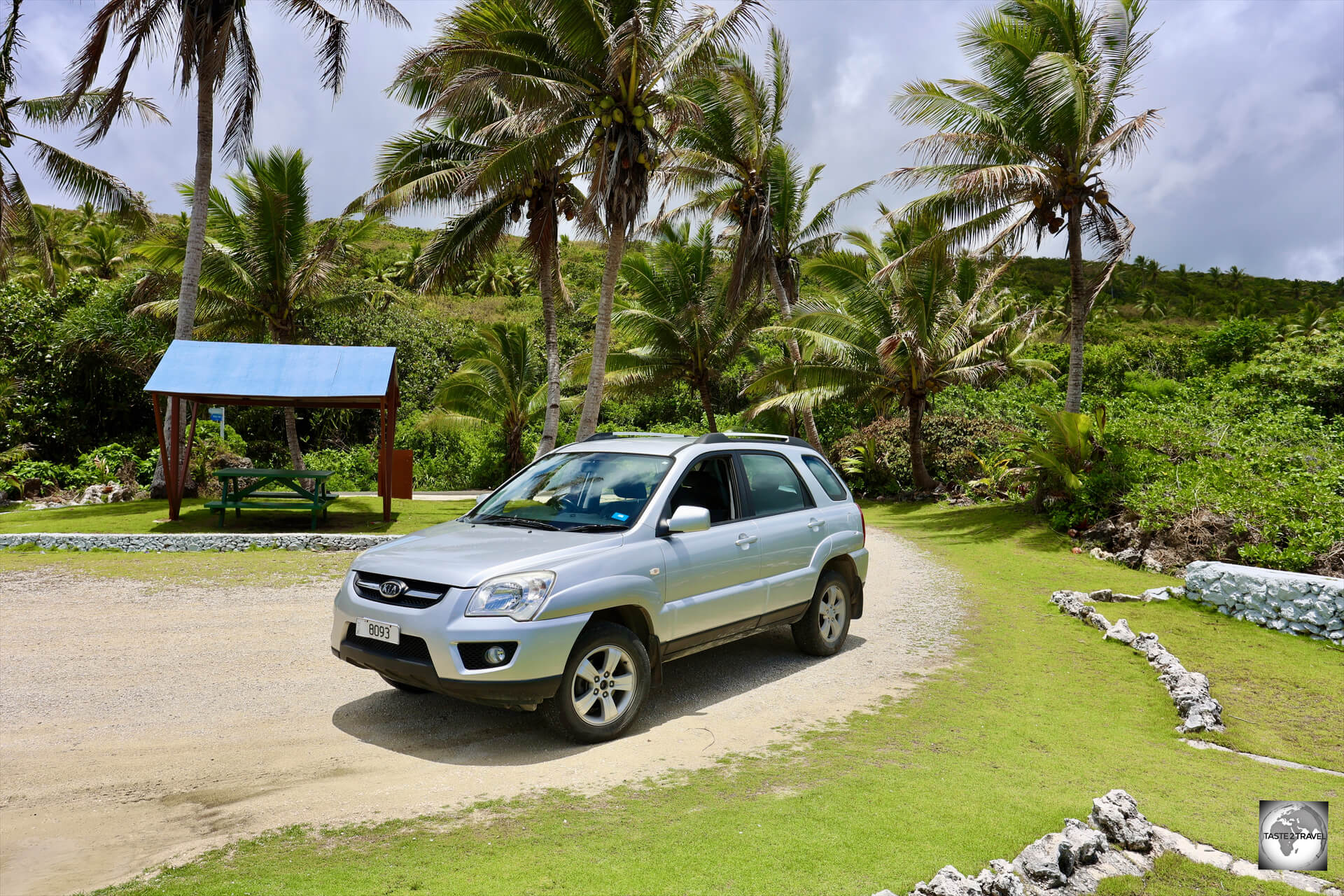
Driving on Niue is very relaxed, with lots of scenic lookouts, little traffic and very friendly drivers.
While I was on the island, the Chinese government, as part of its ‘China Aid’ program, was busy upgrading roads and installing footpaths, and gutters in Alofi.
While most roads are sealed, some of the back roads (especially on the sparsely inhabited east coast) are heavily potholed.
There are a number of car rental companies on Niue, including the following:
I used the services of Niue 4×4 Rentals which is owned by the very friendly ‘Willie’ who is also supported by his very competent daughter.
Upon arrival at Niue Airport, I was met by Willie’s daughter, who pointed out my rental car on the other side of the airport car park. The keys were left in the ignition and the car was unlocked. Never do you need to worry about theft on tiny Niue.
Rental Car Costs

Exploring Niue, in my comfortable Kia Sportage, which I rented from the wonderful Willie at Niue 4×4 Rentals.
As for charges, my very nice Kia Sportage cost NZ$60 per day. I was told I could make payment anytime during my stay on the island.
Willie’s daughter works at the Crazy Uga Cafe where I often ate breakfast. The cost of my car rental was simply added to my breakfast bill one morning with everything paid with credit card at the cafe. Easy!
At the end of my stay, I left the car, unlocked, in the airport carpark with the key in the ignition.
A very nice and relaxed rental experience!
I would highly recommend Niue 4×4 Rentals for your rental car needs.
Niue Driver’s License
Under Niue law, anyone driving a vehicle on the island needs to hold a valid Niue Driver’s License.
You can apply for a license, from Monday to Thursday, at the one Niue Police station, which is across the road from Swanson’s supermarket.
A license costs NZ$22.50 and takes about 5 minutes to issue – including having your photo taken.
Fuel Station
The Central Services Petrol Station is the one and only fuel station on Niue. It is open Monday to Saturday, 7 am to 7 pm, and Sunday, 4 pm to 7 pm.
The fuel station also sells some basic groceries such as bread, pies and milk.
Fuel is shipped to the island on the monthly supply ship from Auckland.
At the time of my visit (December 2023), one litre of unleaded fuel cost NZ$3.50 (US$2.18).
During my week of driving on Niue, I used less than a tank of fuel.
That’s the end of my Niue Travel Guide. If you wish to leave feedback you can do so using the form below or via the contact page.
Safe Travels!
Darren
Further Reading
Following is a list of other taste2travel content from the region:
- American Samoa
- Central Pacific Island Hopping
- Chuuk
- French Polynesia
- Galapagos Islands
- Guam
- Kiribati
- Kosrae
- Marshall Islands
- Nauru
- New Caledonia
- Palau
- Papua New Guinea
- Pohnpei
- Samoa
- Solomon Islands
- Tokelau
- Tonga
- Tuvalu
- Vanuatu
Author: Darren McLean
Darren McLean is an Australian, full-time, digital nomad who has spent 37 years on a slow meander around the globe, visiting all seven continents, 192/ 193 UN countries and 245/ 251 UN+ countries and territories.
He founded taste2travel to pique one’s curiosity and inspire wanderlust.



